
What was your first home computer? The one that made you "fall in love" with programming.
There are 300+ entries, many (most?) of which are duplicates.
As with all Stack Overflow poll type Q&As, please make certain your answer is NOT listed already before adding a new answer - searching doesn't always find it (model naming variations, I assume).
If it isn't already exists, vote that one up so we see what the most popular answer is, rather than duplicating an existing entry.
If you see a duplicate, vote it down so the top entries have only one of each model listed.
If you have interesting or additional information to add, use a comment or edit the original entry rather than creating a duplicate.
Commodore 64!

zx Spectrum 48k
Take that you 16k owners :D
Check it OUT! http://www.twinbee.org/hob/play.php?snap=jetsetwilly

(c) 1982 Sinclair Research Ltd.
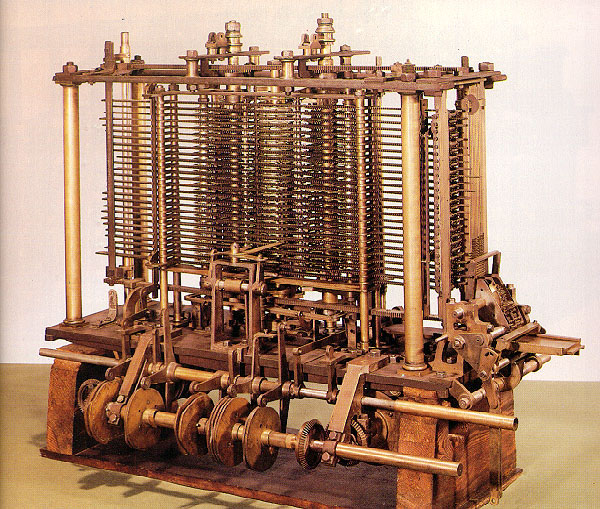
A 386DX, when I was about 4. It was state of the art, and cost about $1500 or something stupid..

Also had a turbo button (didn't know why it existed)
ZX81

Amiga 500! With BASIC!!
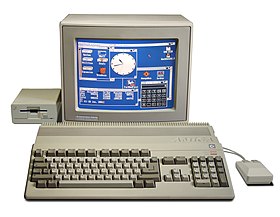
TI-99 4a [1]
It had a crusty old TI-BASIC interpreter and you had to save programs on audio cassettes. I still remember how awesome it felt the first time I got that to actually work!
Apple ][+ - learned BASIC, then taught myself assembly.

BBC - awesome machine!

Not programmable (I guess you could hack the ROM), but I distinctly remember the a-ha moment on groking division [1] while holding the Little Professor in my hand.
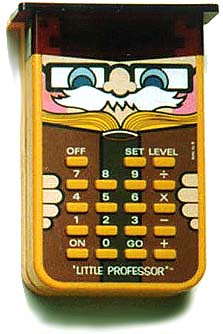
Huh, I just discovered it's featured on The National Museum of American History http://americanhistory.si.edu/teachingmath/html/enlarge/2001_9284.htm website.
[1] http://en.wikipedia.org/wiki/Division_(mathematics)TRS-80 [1], I believe, was one of the first I ever got to use (as a very small child). The first one I actually programmed on was an Apple IIgs [2]. I prgrammed all sorts of stuff in Apple BASIC, and used to run programs that were printed in a computer magazine (can't remember the name of it). That did it for me, though it took a lot of years (college) before I actually dove into computers head first.
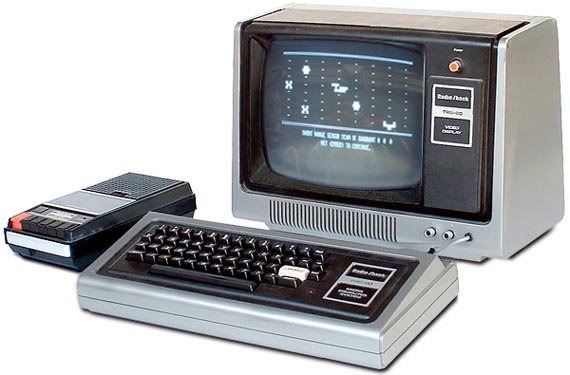
I still have the old IIgs sitting around some where. I'm tempted to see if it still works!
[1] http://oldcomputers.net/trs80i.htmlApple IIe, programming in BASIC, of course.
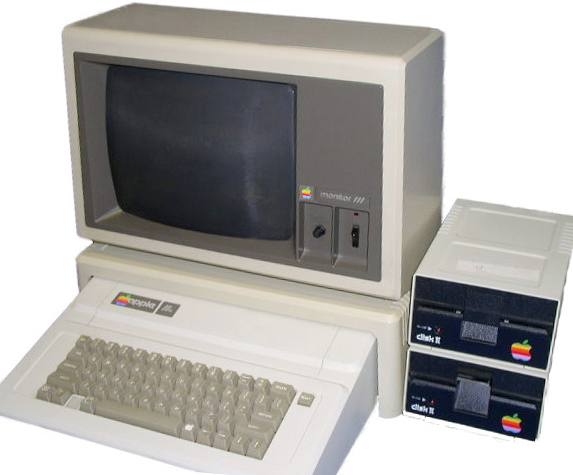
The IBM PC model 5150 -- the current Wikipedia poster child [1] for all IBM PCs!
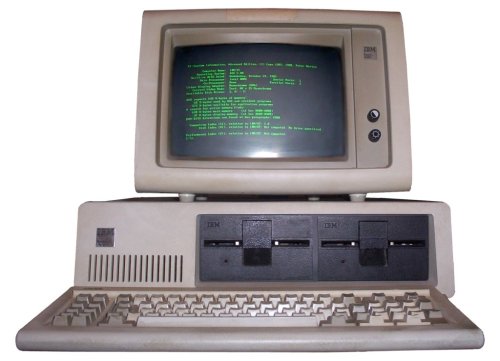
My Dad brought this home from his job at IBM when I was about 4 or 5 years old. Specs of the 5150 that we had:
Like other machines of the time, the 5150 came with BASIC on the ROM image; the machine would boot to the BASIC development environment if there was no floppy in the A: drive. You couldn't save your programs, though, unless you booted to a DOS diskette (DOS 2.0!) and ran BASIC from there.
By the time I was 6, I was spending hours and hours programming on this thing! F1=List, F2=Run, F3=Load, F4=Save...
Dad eventually added a 2400 baud modem to the machine -- I was in 3rd grade at the time, so around 1985 -- and I logged onto my first BBS [3] from this machine, too.
[1] http://en.wikipedia.org/wiki/IBM_PC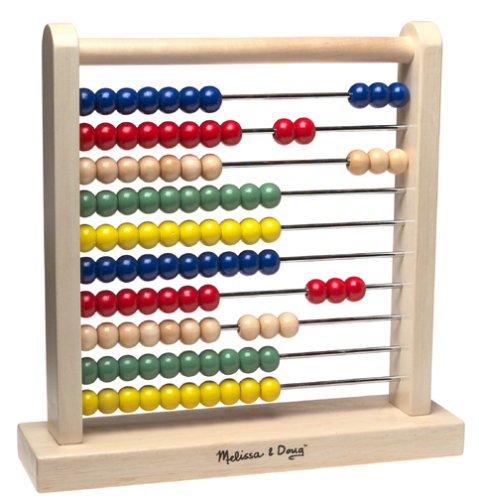
Atari 800 XL!! --yeah, I'm getting sentimental too... sad... :)

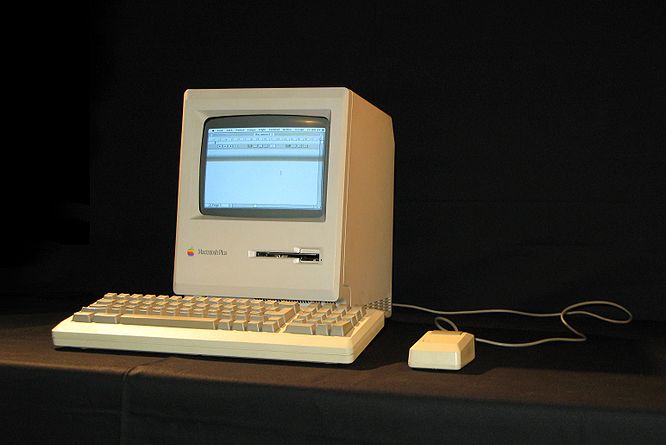
TRS-80 Color Computer II
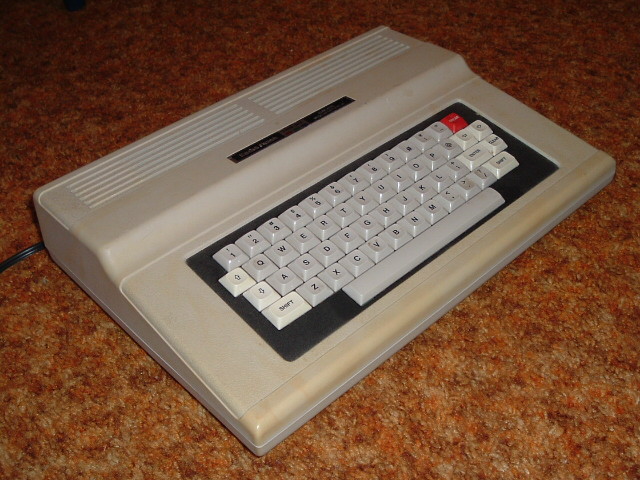
Mine was a portable :)


ZX80!
still have it.
still works.
Commodore Pet Basic 4.0, 32K ram and a tape drive, this was back in 1981.
I wrote a version of Defender on it ( called Paladin ) in 13k of hand coded 6502 using the hex editor since the assember required a disk drive and I didn't get one of those for another year.

My first was the Apple IIc [1]. This was arguably Apple's earliest aesthetic device, so I figured it needed its own answer.

The great ATARI 1040 STF [1] with 1 MB RAM and the razor sharp SM 124 Monitor.

My first programming environment was GFA Basic [2], a really impressive Basic Interpreter with procedural concepts.

TRS-80 Color Computer [1] First edition with the chiclets keyboard.

Amstrad CPC 464


Osborne 1 [1], running CP/M. I learned BASIC, Pascal and DBase programming on that one! Sweet memories... all my friends had Commodore C64:s, but I had a real computer with no graphics capabilities and no games.
[1] http://oldcomputers.net/osborne.htmlAmiga 1000, the first Amiga home computer.. hey, I had the expansion to 512KB of RAM! :D
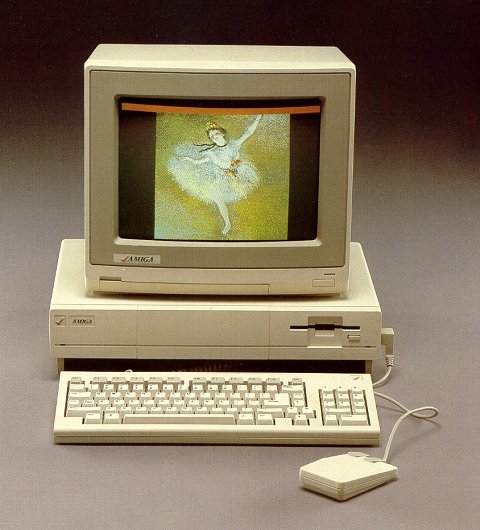
Amstrad CPC 6128 [1] Similar to the 464, but had twice the memory (128Kb!) which was paged because an 8-bit processor can only address 64Kb at a time.

Also it came with a 3" floppy drive instead of a tape drive.
No, not 3.5", 3"

Commodore 128!

I started programming on the HP-48S, in RPL (Reverse Polish Lisp) that made me love Forth and Lisp.
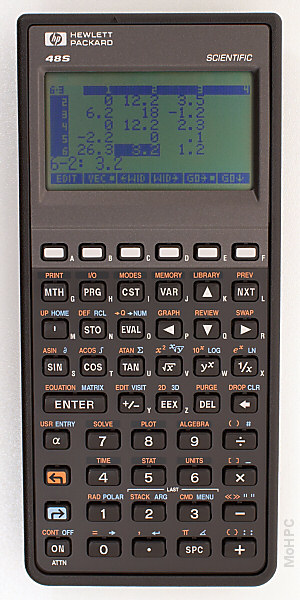
The mighty Acorn Electron, purchased from Boots the Chemists because my parents could not afford the BBC Micro that I really wanted. It allowed me to do my school computer club homework at home though. My "monitor" was a 14" black and white TV with a rotary tuning knob. It would slowly drift off frequency and need tweaking back on to the correct channel periodically. "Elite" seemed to take forever to load but was one of the most awesome games ever.
Acorn Electron on Wikipedia [1]
[1] http://en.wikipedia.org/wiki/Acorn_Electron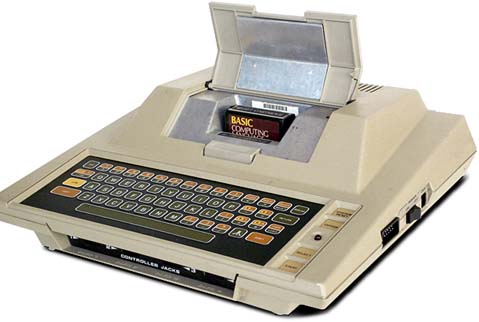
Apple IIgs (used). Taught myself basic on it.
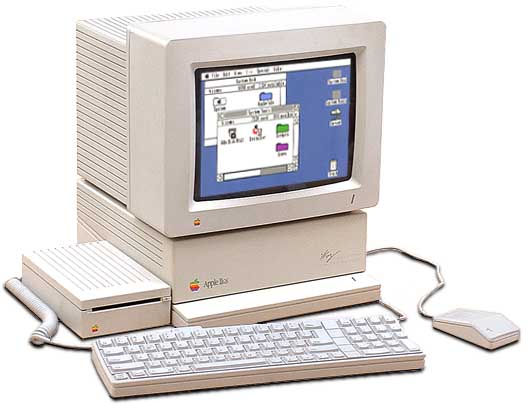
IBM Ps1 hehe with 2mb of ram

Atari 800. $747 - 24k - cassette. Upgraded to 90k floppy $444.00. $250.00 to upgrade RAM to 48k. $200 for 16k RAM module and $50.00 to solder 16k onto the existing 8k board. ( bruceatk [1])



Ferranti Mercury. They didn't have "Home Computers" back then...
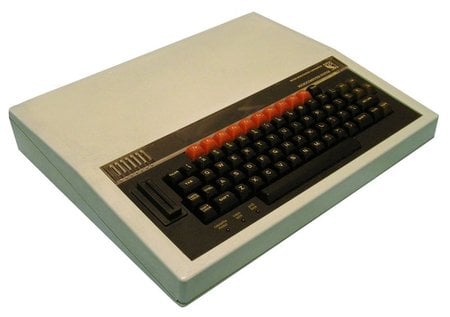
A BBC Micro Model B when I was 7
It had a cassette interface and plugged in to a regular TV
I taught myself Basic on it and then taught myself 6502 assembler.
Some years later we got a word processor (Acornsoft View) ROM installed in it, a floppy drive (double sided, double density, twin floppy drive!), a proper monitor and a dot matrix printer.
It was all the computer I needed for about 10 years
[1] http://upload.wikimedia.org/wikipedia/commons/3/37/BBC_Micro.jpegCommodore 128D /w Epyx Fastload Cartridge

Though I had access to a few Apple ][e's and such before I owned a PC.
Mine was the Timex Sinclair 1000
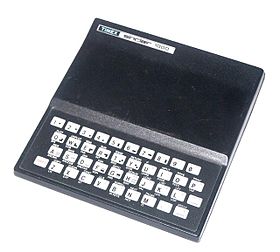
soon after was the TS2068
Zeos 486dx2. 66mhz of screaming raw processing power. It could play doom. Also, it weighed about 40 pounds since the entire case was made out of what seemed like half inch thick steel.
It eventually died (bad power supply), although the 14 inch monitor soldiered on for a few more years before starting on fire and going out in blaze of glory.

Commodore Amiga. First home computer to have a dedicated graphics processor (AGA).
Mine was an Amiga 1200, 2MB RAM, 14MHz CPU, 3.5in floppy, no hard drive. I got it in 1992.
I got a demo of AMOS Professional with a magazine. In less than 770KB it provided a BASIC interpreter, editor (with auto-indentation), animation capable paint package, audio editor, 2-pane file manager like FreeCommander, online help and sample programs including a Mandlebrot explorer and a Mario clone. All in 770KB!
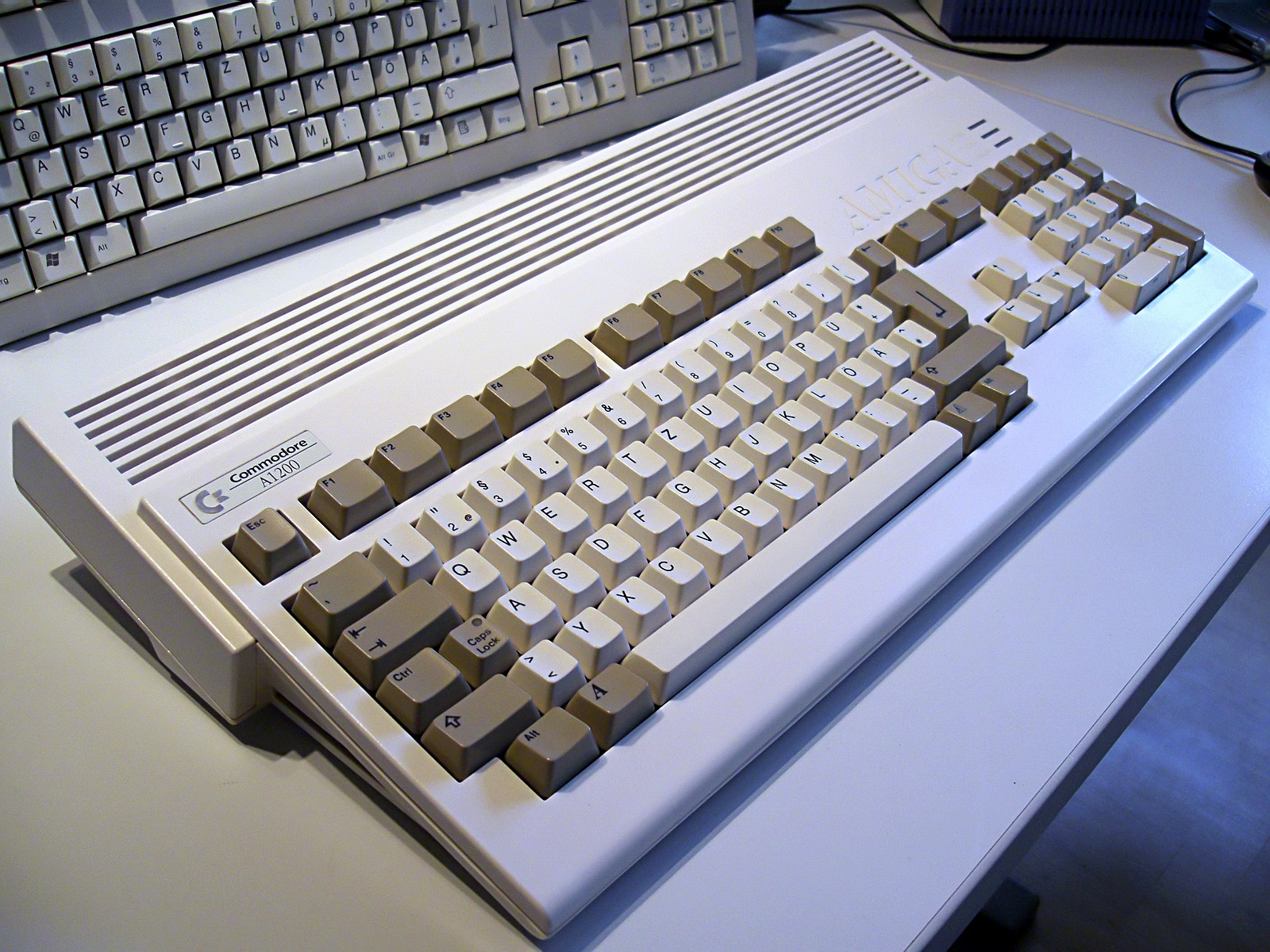

A borrowed copy of Basic BASIC [1], and a pad of paper.
My parents couldn't afford to buy me a computer (I couldn't afford to purchase my own computer until after I'd been programming for 8 years). The local high school didn't get a computer until the following year. The closest computer access for me was a dialup terminal at a public library 20 miles away.
So my first dozen programs were all written out by hand, and then executed on paper...
[1] http://rads.stackoverflow.com/amzn/click/0810451069No pics, but mine was a 286 PC, 640K RAM, no hard drive, but it had TWO FLOPPY DRIVES (A, B).
So we used to create a RAM drive on it and load TURBO PASCAL, a fantastic compiler and really a beautiful language to program (Pascal).
Kaypro II!
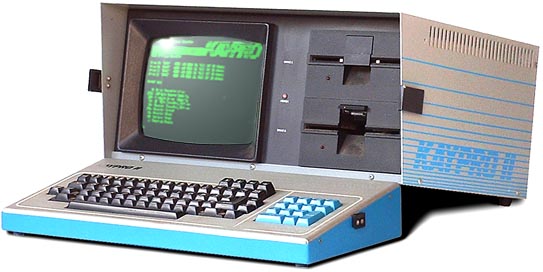
Learned BASIC on this bad boy.
Colecovision + Adam computer [1]. This thing was inexpensive, came with a cassette drive, printer and Apple BASIC. I was able to upgrade to a Commodore 64 shortly after.


Dragon 32 With a 5+1/4 drive incuding Sprite Magic! Those were that days.

IBM PC Jr with extra floppy drive, extra memory, color monitor, chicklet keyboard and a daisy wheel printer. I was the only person in my dorm with their own PC in 1987.
Image copied from Wikipedia [1].
[1] http://en.wikipedia.org/wiki/IBM_PCjrI don't see it here, but a school friend had an old Oric-1 [1]:

Did anyone else have one?
[1] http://en.wikipedia.org/wiki/Oric#Oric-1The IBM PS/2 [1] owned by my parents (still working to this day).

atari 520 stfm
Was the only one at school to have one of these, everyboby else had amiga 500's. I took my first look at code on this one, but couldn't get any of the stuff in a 'type this in and hit run'-book to work so gave up.
It did however teach me to solder, as the neighbour's 2-year-old sat on it, pushing one of the (pipe-ish thing for getting a hole for a screw deeper inside the case) through the keyboard pcb, breaking about 20 connections.

The first machine [1] I got my hands on, was in year 1995, a Sinclair ZX Spectrum 128. [2] I was just 10 years old and had started my tryst with code.
Tell you, you can't even imagine how HAPPY :) I was, to own a 'PC' (if you may call it) which
But, it was good enough for anyone who has to start learning programming I did and grew along as the PCs around me did too.
First computer is like your first love. You can't just forget it.
[1] http://www.mohitnanda.com/blog/2009/01/my-first-machine/I started on a
TRS-80 Pocket Computer
[1] that my uncle gave me when I was 9 or 10:
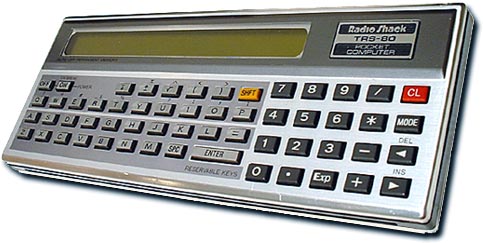 I punched in a BASIC slot-machine program from a manual, and edited the source so I could cheat! Those keys were tiny, even for a kid!
I punched in a BASIC slot-machine program from a manual, and edited the source so I could cheat! Those keys were tiny, even for a kid!
Commodore Plus/4
Amstrad PC 1512 [1]
with two 5.25" floppy drives and a color monitor
It came with MS-DOS and the GEM window system. When I tried to make a backup copy of the GEM floppy, I actually destroyed it by confusing the SOURCE and DESTINATION parameters :-) That was my first WTF moment.
But I didn't find out about programming until I got my next computer, found QBasic and read the help file.
[1] http://www.old-computers.com/MUSEUM/computer.asp?c=183While not as cool as many above.
Packard Bell 486DX2, 4MB on-board RAM, few months later I upgraded with additional 12MB on three 72 pin simms.
Dragon 32.

I had the TI-99-4A and the Extended Basic cartridge. Made a pretty decent Pac-Man knock-off at the time too. I think we even sold some software cassettes of it here and there.
I remember using the sprite animation to create little music videos - I mean if you were going to have a cassette player hooked up to the thing, you might as well pump some music out too!
Commodore 16... parents did not want to buy me the 64k version... ahh miss those days.

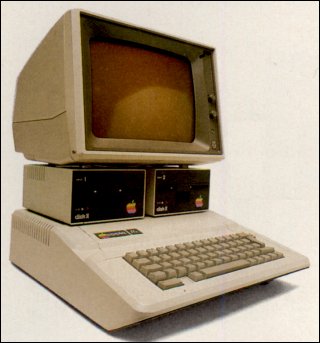
I learned to program on the Apple ][e. AppleSoft BASIC is... is not something I like to think about too much ;)
The Macintosh SE was the one that made me fall in love with computers.
Atari 130XE... with an XC-12 tape drive!

An old Compaq
An 8088 PC-XT clone running at something like 4MHz. 640kb RAM, MS-DOS 3.0, and GW-BASIC. Don't believe it had a hard disk, but hey, when you have two bootable 5.25" floppy drives, who needs one!?
Timex Sinclair ZX-81 / 1000
The HP 41C and synthetic programming [1] - the notion that data and instructions were stored in the same (binary) format was a revelation for me as a teen. Pulling modules to blur that line between data and programs also felt like dark magic.
[1] http://www.hpmuseum.org/prog/synth41.htmLike a lot of Dutch: MSX Philips VG 8020.
I remember one time, I had programmed a fractal (Mandelbrot) in MSX-Basic. After 1 week (!) of calculating I came home from school. My mother told me, she turned off my computer when cleaning the room.
But the first computer I ever used was (naturally) the IBM System 34 (or 36, don't really know, I was only 10 years old). When I was visiting my father at work. After 15 minutes I was able to find the games.
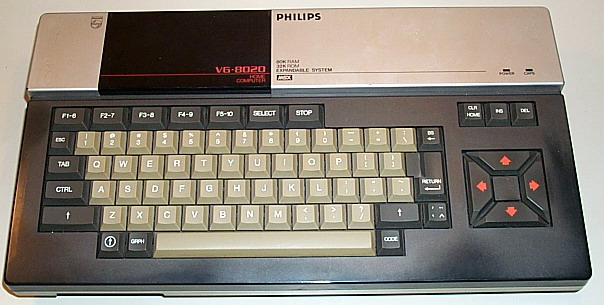
The 1st computer in our home was a Z1013, a ZilogZ80 compatible single-board computer made and sold in eastern germany from 1985. It had a 1Mhz processor and 16KB RAM.
http://de.wikipedia.org/wiki/Z1013

It was a Compaq Portable [1] with an 8086, 20MB HDD, and 2 5 1/4" drives.

Vector Four. CPM operating system. Z80 processor. 2 8-inch floppy drives. And Basic, where I got hooked on coding.
Read more about it here [1]
(I see someone listed a Vector One [2], but this one is quite a bit different.)

I got an Acorn Electron in 1993 from my brother in England, who inherited it from a crazy trip to a car boot sale. I leaned how to use a keyboard and write BASIC, getting magazines to get listings for Games. I still have the thing along with an Amiga 600, which I got years later.

My first computer was a Logix Electronic computer.
With a clock frequency of about 0.2 Hz. 8-)

Mine was a Synertek SYM1 6502 development board with (IIRC) 1K ram, a 20 something key membrane keypad and 6 digit LED 'display'.

I later expanded to 4K ram, a BASIC ROM, and a keyboard + TV adapter.

Christmas gift. A little expensive, but worth its cost.
Dick Smith VZ200 [1], for all the Aussies (and Kiwis, apologies spdenne) out there

HC-90 (with a Z80 microprocessor)

Schneider CPC 464
"The Schneider CPC-464 was produced in Germany by Schneider Rundfunkwerke. It was first marketed successfully in Germany, then in France and Spain and maybe other European countries. It was basically the same machine as the Amstrad CPC-64 with a less colorful case and keyboard and some slight hardware differences, like better quality back connectors." ( link [1])
I later even upgraded with a color monitor an external floppy disc and an annoyingly loud printer...

The KIM-1 based 6502 Microcomputer
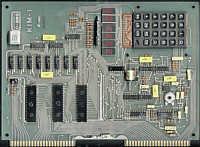
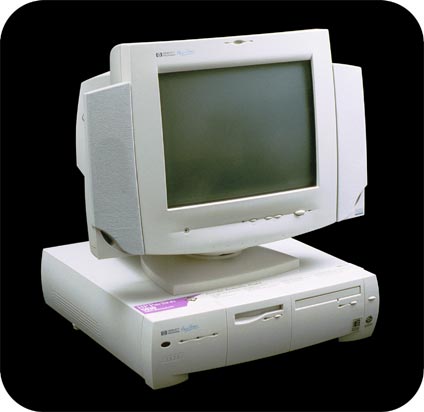
The first computer my family owned was the HP 5030, preloaded with Windows 95.
I feel insufficiently old school.
Although, the first computer I used regularly was the Apple IIe's at school. The sales clerk was a bit confused when I said I wanted to buy one of those suckers when my parents said we could get a computer in 1996.
Self-made computer Radio-86RK from a russian magazine.
i8080 compatible processor, 32KB of RAM, running Microsoft BASIC.
BBC Model B - my father managed to cobble a 3.5" floppy drive to it (rather than the then-standard 5.25") and I still remember installing a word processor by physically inserting a microchip!

An Amstrad 464 with a green screen and a tape deck.
Dad had a Franklin ACE1200 (the Apple ][ clone with double full height 5 1/4" drives)

which we wrote a BASIC looping program to 'do' my 'homework' (entire class punishment for something trivial) of 100x "I will not yada yada" given by a lunch monitor.
my own first computer was a C64 which i punched a few basic progs from some books into until someone gave me a box of games.... and so endeth my programming life until university!
My first computer was the Timex Sinclair ZX81 as a birthday gift in 6th grade and I then purchased the 16 Kb memory module upgrade so that I could load the cassette tape based games that I had also bought with allowance. I remember loading and saving programs to tape and eventually writing a Farm Market Simulator game and playing that with all of my friends in the neighborhood. We'd all crowd around the old B/W television set and watch the random numbers generated for corn, soybeans, cows, and pigs and then we'd all pick how much we'd invest in the items each month.
It was my first introduction to programming and even though I couldn't get my hands wrapped around how the games I played worked, Flight Simulator and Maze, it started me down the technology path and shaped the patience I have for troubleshooting the issues I run into today. Thanks Timex/Sinclair...
IBM Model 5120 [1]
I've still got a box of 8" floppies around somewhere.
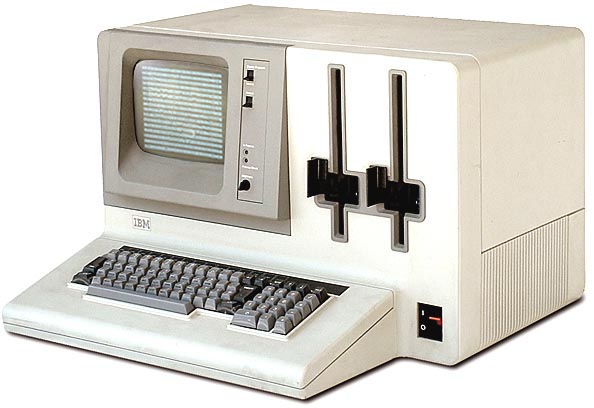
Toshiba MSX 64k

An Aquarius [1], it came with 4k of memory! I still have it in storage, just for kicks.
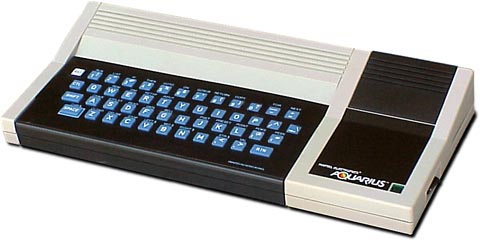
Tandy RLX 1000
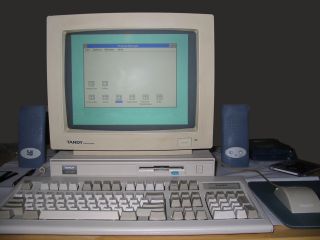
I don't yet see an image of...
Spectravideo SVI 728

Yes, the keyboard is just as terrible as it looks.

Zenith/Heathkit Z-100. Came with an 8-bit Intel 8085 that ran CP/M, and a 16-bit Intel 8088 to run MS-DOS or IBM PC/DOS OS's. Got the Amber monitor! Got a student discount from The University of Texas.
A 486DX IBM PC Compatible Computer running on Windows 95.. Back then I used it to program in Pascal and C...
TRS-80, Scott Adams adventures!
Then on to Commodore Vic20, 64, Atari ST
286SX with a whopping 2Mb RAM or would the Speak&Spell qualify?
Like several others here a ZX81 with 16K RAM pack, but I just wanted to add...
After all these late night typing in programmes sessions, was I the only kid to get in trouble at school for writing my sums like this:
What is 13 * 3?
ANS$ = 39
I got in such trouble for that...
Pravetz 8 [1] - Made in Bulgaria:) It's an Apple II clone if you wonder. It was kind of common in Bulgaria back in the days.
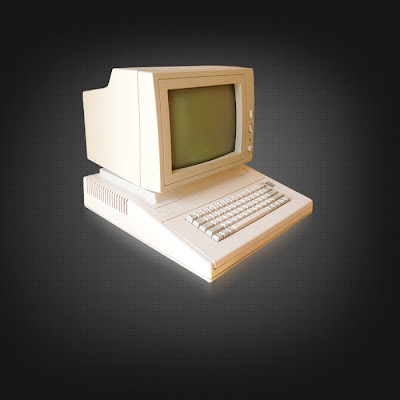
My first was the Tandy TRS-80 Color Computer 3 with 128K of ram!
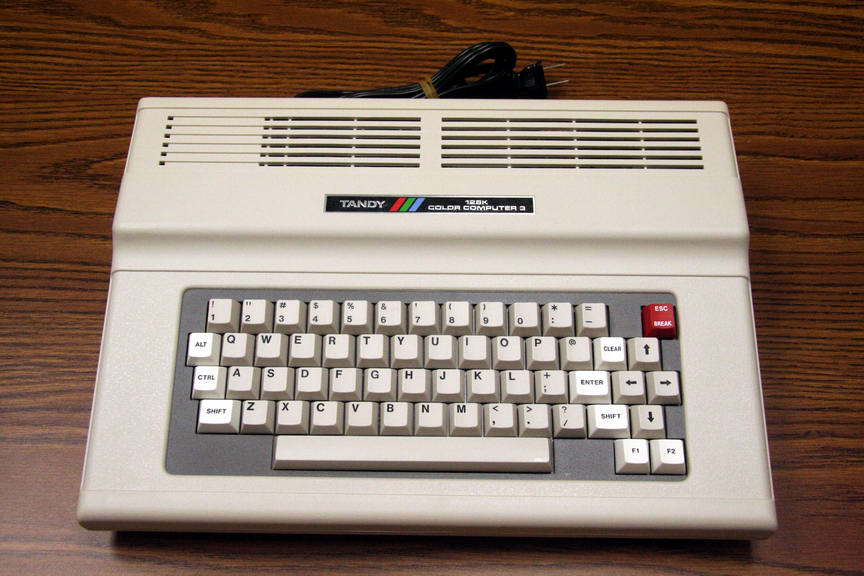
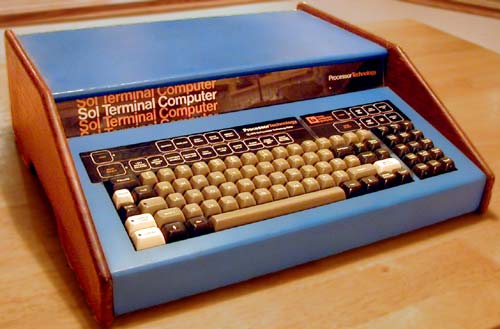 The Sol-20 by Processor Technology which was based on the 8080 processor from Intel. I learned assembly language and it had the horrid audio cassette way of saving data. Eventually I got a 2400 baud modem and used that as well.
The Sol-20 by Processor Technology which was based on the 8080 processor from Intel. I learned assembly language and it had the horrid audio cassette way of saving data. Eventually I got a 2400 baud modem and used that as well.
(Picture from sol20.org [1])
[1] http://sol20.orgProgrammable microcalculator MK-61

A TRS-80 [1]
It had a fantastic 16KB of ram. Later added the Expansion Interface, a box as big as the computer, which increased the memory to a total of 48KB, and allowed you to add a floppy driver.
[1] http://en.wikipedia.org/wiki/TRS-80Mine was "Alice32" ! French computer :p

A Nascom 1 of 1978/79
1 MHz Z80, 2 kB RAM of which appr 850 bytes user RAM, 1 kB ROM, RS232, RF out, TTY, PIO lines, 300baud casette, single board uncased.
Z80 machine code + monitor


The Franklin Ace 1000
Eventually, Franklin lost a patent infringement lawsuit to Apple, for this fine Apple ][+ clone.
I learned to program BASIC on this guy, waaaaay back in the mid-1980s. My brothers and I used to write text adventure games on it.
Brazilian computer CP 500. MIne was white. Urgh... ugly, but I loved it.

Amstrad CPC 464! :)

All my friends had nintendos and amiga 5/600's at the time - but when my mom came home with one of these bad boys I was sold :)

My first foray into computers was a HP 41CV [1]. Do not for one moment think this was a mere calculator just because of the form factor.
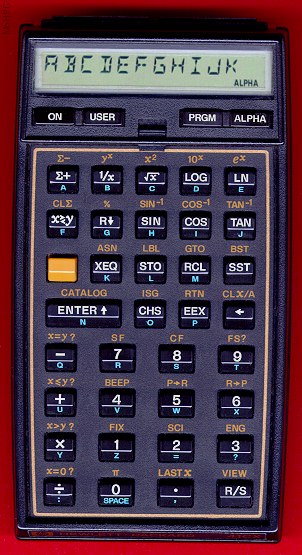
My first computer was PRAVETZ 82 [1]. You may not have heard anything about it. It was a clone ("pirated" copy) of Apple II produced in a former communist country :)
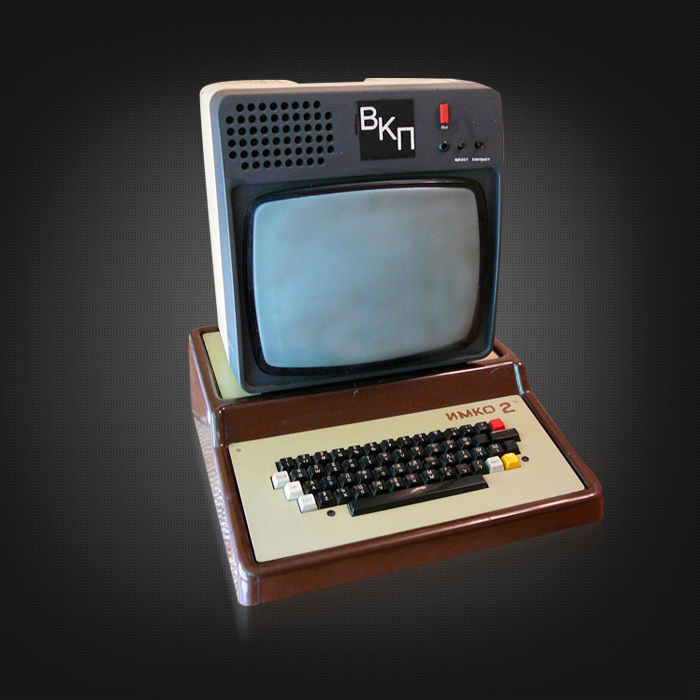
In 1971 I bought a Kenbak-1 [1], which was declared in 1987 to be the first commercially available personal computer. I had just started working on my MSCS degree, and had taken an assembly language course for the Univac-1108. I wanted to continue writing assembly language at home, and this machine, with its large number of addressing modes (but tiny memory), was fun to learn on. My machine is now in a vintage computer collection [2].

My very first computer was a TRS-80 Color Computer. I love that ugly grey wedge so much. Many a night was spent in the Dungeons of Daggoroth. :)

Oh wait. You said "programming." Well, TI gave me a programmable calculator I could take home. That was 1979. But I didn't use it much. The first computer I took home had a "Turbo" button on it. If you didn't push the button, it ran at 6Mhz, to let games run that depended on timing. I wasn't too long after that when I got a laptop. I think it was 20MHz, maybe 40Mhz 286. It's probably in the garage collecting dust.
The first computer I programmed was an IBM 360 in 1971, but that was for a paying job, and the computer was a tad large to take home. :-)
The Compaq Deskpro 386.

Ours had upgraded hardware, and was able to run OS/2 2.0. Learned QBasic on it. I still miss many of the DOS games I used to play on that machine...
I started actually programming on a TI-82, editing the BASIC games that I traded with a friend in my 7th grade algebra class. So much fun.

awwe geez, here's one I don't think anyone would know...
VIDEOTON TV-Computer
Learned BASIC on it

it even had a slogan - "Kein Bild, Kein Ton - Videoton"

Ohio Scientific Superboard II
I joined too late. I'm not going to post what computer I started out with, because I'll get laughed at on how modern it is :(
Vtech Precomputer 1000 [1] at age 8
Fundamentaly an educational toy, but it had a BASIC interpreter which was the only feature I ended up using :D
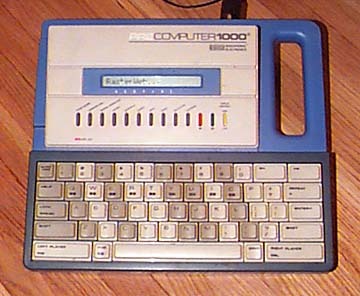
I had a REAL computer.
With a HARDDRIVE. And a CD-ROM DRIVE. It ran WINDOWS 3.1!
(No idea on the stats, I just remember it ran Jazz Jackrabbit from DOS)
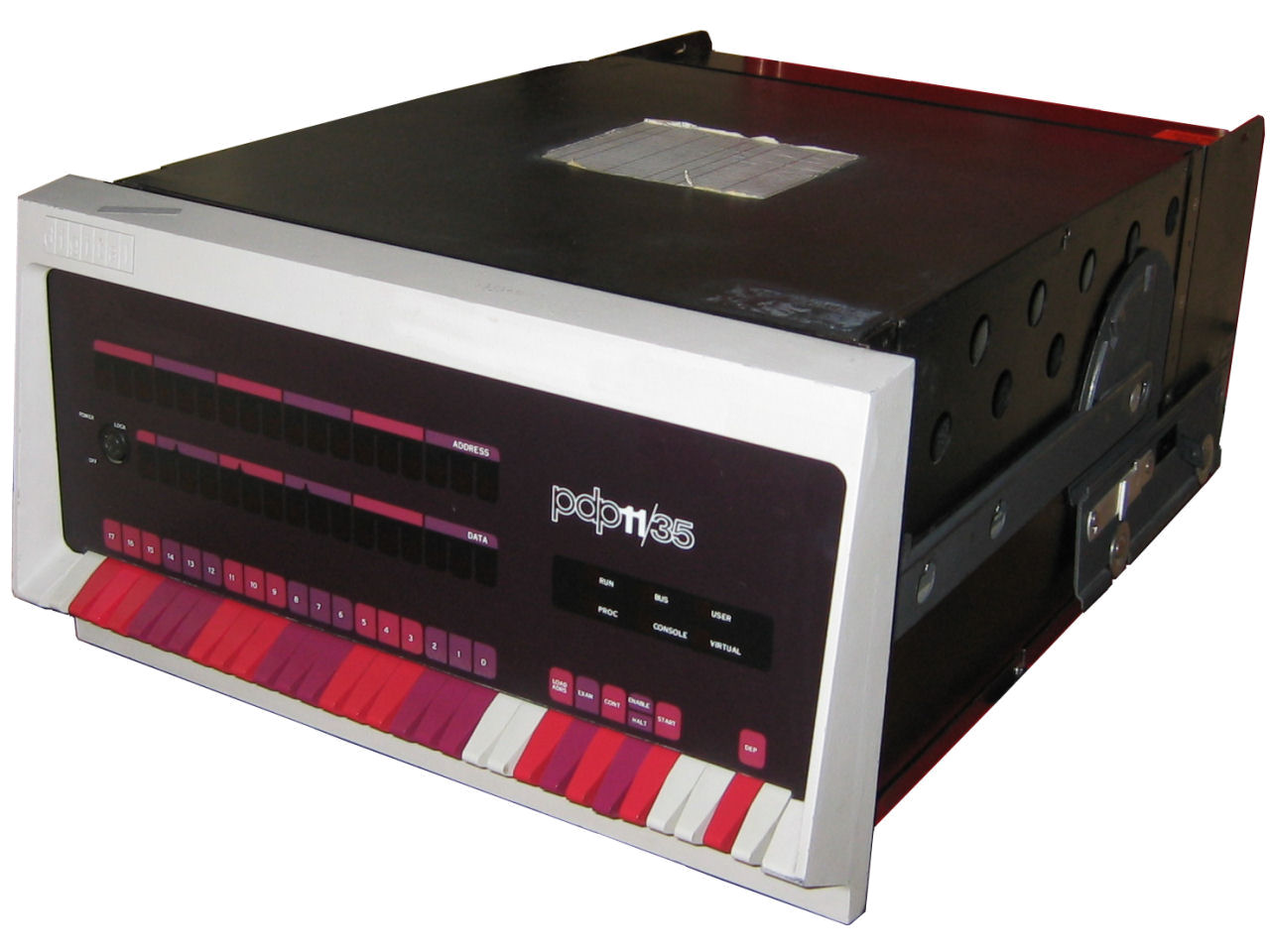
well, an 11/44, actually, from a company that didn't want it any more because they were upgrading to VAX. The power bill went up, but I never needed to turn the heating on that winter!
This handsome devil:

Which was essentially a Scubaventure [1]-dedicated machine.
[1] http://www.mobygames.com/game-group/scuba-diving-snorkeling-gamesThe Intellivision Odyssey 2.. Technically just changing the cards for the game controllers can be considered programming. (as a kid I was the only one that could figure it out when my parents couldn't.)
Also - you can consider the times when playing Astrosmash [1] on level 10+ and having smart bombs fly right through you can be considered software debugging. (that is when I first learned about sprite-collision.)

Superboard II - Challenger 1P (from Ohio Scientific. 4kb RAM!). We used it in our school for our Computer Club.

Sharp MZ-80K

It was my grandmothers, got me interested in programming.
This one
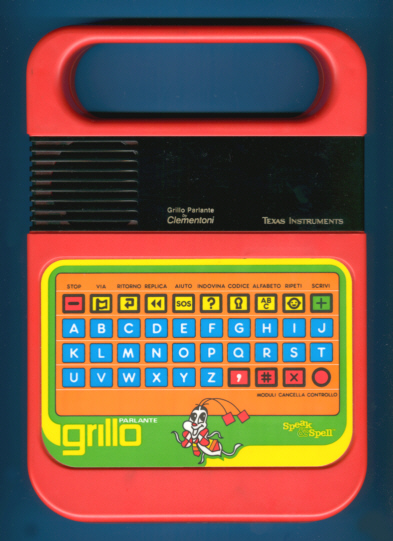
More infos here [1]. Although I would also like to report my second computer, also a rarity

the Commodore SX-64. Not really portable... movable I would say.
[1] http://datamath.org/Speech/GrilloParlante.htmThe IBM Convertable! Taught myself Basic on this bad boy.

Ohio Scientific Challenger 2P
It had several different operating systems, OS65D, and UCSD Pascal. I either typed games in from books and magazines or bought them.

Being from Sweden, I obviously had a Luxor ABC 802. Never heard of it? Well, one of their slogan were "who needs to be IBM compatible?" so...
TRS-80 MC-10. I think my mom got it free from some crazy guy my step dad knew in the early 80s, when I was about 13. It came with the small keypad, 4k RAM with an external 16k module, cassette loaded, a few books with BASIC programs, and you could connect it to a color TV.
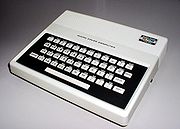
Atari 600XL - still have it in the box somewhere with tapedrive and busted powersupply.

Despite the 380+ answers, this one was still missing: MikroMikko [1]!
These were manufactured in Finland by Nokia Data, a division of the company that later went on to concentrate on mobile phones and networks. (Nokia Data was sold in 1991 to ICL, which in turn was absorbed to Fujitsu, or what nowadays is Fujitsu Siemens Computers.)

I had the original model, MikroMikko 1 (pictured), which dated from early 1980s. It was equipped with:
I can't really say I fell in love with programming with it - I just toyed around and created primitive Basic programs. (I did plan some elaborate text adventure game but never got around implementing it properly with my very limited Basic skills.)
[1] http://en.wikipedia.org/wiki/MikroMikko386SX with a 40Mb harddrive. Can't remember the RAM...
Had both 3.5 and 5.25" drives and a colour 9pin dot matrix printer!

The Datavue Spark, though mine was white(ish)!
I've had countless nights with GW-Basic, Quick Basic, DOS debug and old Sierra games together with this beast...
My screen died after about a year, after I fiddled with some wires back in the modem slot, and after that I had an external CGA montitor instead.
The Datavue Spark was one of the First Laptops Ever Made. It Featured a Powerful (Back Then) Intel 8088 with a clock Speed of 9.77MHz.
It had a tiny blue 5” screen made by Epson that supported 16 Colors. DOS could be run on this system, but needed a boot disk to do anything.
Due to a very high retail price, very few Spark were sold. Datavue made it up until 1993, then the company went under due to the many more powerful laptops on the market at the time. Datavue produced many other laptops.
A Thomson TO7/70 [1]

The image is stolen borrowed from Wikipedia :-)
Apparently I'm the only one so far(!)...
I give you, the mighty, Amstrad PCW9512:

Primarily a word processing machine - you could either boot into LocoScript, or if you used a different (3") floppy, into CP/M. In CP/M you could use something called 'Mallard BASIC' (if memory serves - so named because it was as fast as an Olympic runner named Mallard!)
Ahh... the nights I was kept awake by the thundering of the daisywheel printer. Sounded uncannily like a machine gun!
The Sharp PC-1211 hooked me into computing:
I can't believe nobody has mentioned the Acorn System One [1]
1k of ram, plus another 128 bytes in the io chip
I managed a basic interpreter, a 7 segment space invaders, and a Mastermind game solver (but not all at the same time).
I even bought the 128 byte ram upgrade
[1] http://en.wikipedia.org/wiki/Acorn%5FSystem%5F1Intel SDK-85

PROCESSOR 8085-A, RAM: 512 bytes ROM: 2k
p2 350mhz... shame on me :(
Amstrad 286 with 1Mb of RAM!!
The Sharp MZ80K, which had a tape drive that you could load BASIC from.
Must be 25 years ago.

The first computer I had at home was a Commodore 64 with a tape drive. I used a Commodore PET, TRS-80 Model II, and Apple IIe at school. Later I learned dbase II programming on a kaypro II.
I really fell in love with programming on the 64, Sprites, Simons Basic, even some assembly and C.
A 286 PC when I was in high school.
386 with colour monitor & a enormous 4 MB RAM
Wow, the memories. Atari 800. I was about 12 or 13. BASIC cartridge. ANTIC magazine and a tape recorder to store programs. Learned all about Sprits, DMA, collision and it had an amazing 4-voice synthesizer chip that I coded some vicious music with! I would give a year of my life to go back and spend it in those days again! Wonderful memories for me.
Thomson MO-6. There's very little chance that you know what this machine if you didn't live in France at the time. Awesome computer in any case:

As you can see it used standard audio tapes for storing the software. Copying one was as easy as having a double tape deck (which wasn't that common at the time) and making a copy of the audio track. I think it was a bit of a problem for all the software vendors at the time :)
A brazillian Apple 2+ clone from Unitron:

486 DX2, 4 MB RAM, Windows 3.1
I remember the "Little Proffesor" I think i was from Texas Instruments http://images.google.co.ke/images?q=little%20proffesor&ie=UTF-8&oe=utf-8&rls=org.mozilla:en-US:official&client=firefox-a&um=1&sa=N&tab=wi [1] then i got the Zenith Data Sytems 80286 where i learnt Basic Programming and teaked my 1st game on it... nibbles. It also had Gorilla on it.
CPU: 80286
RAM: 64K
HDD: 32 MB
GRAPHICS: Monochrome
Floppy: 5 1/4 Inch
OS: MS-DOS Version 5
Oh what a Joy!!
[1] http://images.google.co.ke/images?q=little%20proffesor&ie=UTF-8&oe=utf-8&rls=org.mozilla:en-US:official&client=firefox-a&um=1&sa=N&tab=wiI discovered my passion for programming on a Tandy TRS-80 when I was about 6. After becoming bored with the contents of the TRS-80 programming manuals I started adapting programs from any BASIC books I could find to the TRS-80 (and later ported them to my next computer - An Epson PC-XT 8086).
Such fond memories... I wonder if it's still in my parents' garage.

Macintosh IIsi
Man, I still haven't found Carmen Sandiago!
Ye Olde TRS-80. The fist was one of the originals that hooked up to a cassette recorder to read and write data. And the second one - OMG, it had a floppy drive! Very cool.
An ELF kit using the redoubtable RCA 1802 processor. It was a single circiut board with some wood wedges on the back to set it at an angle so you could use the hex keyboard in comfort. A two digit LED display and 256 bytes of memory. Very cool for 1976.
The Amstrad PC1512 was the first computer I actually owned too. I didn't spring for the color monitor tho, had to put up with the weak black & white monitor. I remember swapping out one of the floppy drives for a hard drive. Agonized for days over whether I could afford the 20MB drive or would have to settle for the 10MB. (This was 1986 or 1987.) I remember sitting in my Compilers class, daydreaming of all the stuff I'd install on the drive, and figuring that no way could it use up 10MB -- but I got the 20MB anyway. Maybe I was feeling wealthy for some reason; more likely I was hoping my wife didn't find out how much I'd spent.
+1 for the VIC-20.
I used to hand program a text adventure game out of the one programming magazine I owned every time that I wanted to play it.
Also, long live Omega Race!!! (which was set in the futuristic year 2003)

an abacus
Phoenix Commodore, with 640KB RAM, 20MB Hard disk (early 90s)
A HeathKit H89. It had 2 Z-80 processors!
Well, technically, one of the processors was a terminal controller and couldn't be programmed, but I got a kick out of telling people it had 2 processors.

Ohio Scientific C8P. 8k ram, basic in ROM. 64 character wide screen (spacious compared to the 32 character wide screen of it's predecessor, the C4P).
There were no games for it, to speak of, so I wrote my own, learning programming as I went. Worked for me!
One of these: Sinclair ZX80 [1] OK, it wasn't mine as such, I was only 9 at the time, but I did learn to program on it.

Skizz
[1] http://en.wikipedia.org/wiki/Image:ZX80.jpgA Bally game console with a BASIC cartridge in ca. 1978.
Check out that keyboard. There were plastic overlays for different games and the one for the BASIC interpreter gave you "color" keys -- basically three different shift/ctrl/alt keys that turned it into a "full" keyboard. There was also a "gold" key that provided whole words "print," "goto," etc to make things faster. Wow...what a drag. :)

Apple ][E of course. In fact that computer is older than me (Built in the seventies) but it got me started and I used it for years claiming it as my own when the family got a 386.
I started programming on it when I was seven because my Dad had been teaching my brother how to code on it and I was jealous for the attention. It ended up that my older brother now does nothing to do with coding and it has been my greatest hobby ever since.
Tandy 1000 A. Nothing like computers from the Trash Shack.
Commodore Vic-20. Great piece of kit with those big plug-in 64k RAM Packs.
An unbranded 386 PC with both 5 1/4" and 3.5" floppy drives. It came with DOS but we soon upgraded to MS Windows 3.0 with a dozen or so floppies. Before that I had done programming on GW Basic on school computers, so DOS based QBasic loaded with this thing made me super-excited. It was a super-productive IDE for me :) No need to generate line numbers for each line :)
Russian KUVT Korvet [1]. It was based on Soviet microprocessor, a clone of the Intel 8080 CPU - KR580VM80A [2]
[1] http://ru.wikipedia.org/wiki/%D0%9A%D0%BE%D1%80%D0%B2%D0%B5%D1%82_(%D0%BA%D0%BE%D0%BC%D0%BF%D1%8C%D1%8E%D1%82%D0%B5%D1%80)TRS-80 Color Computer II
although programming with it didn't cause me to "fall in love" with programming
some of the games were fun tho...esp Dungeons of Daggorath [1]
[1] http://en.wikipedia.org/wiki/DaggorathTandy TL/2 1000
Computer that got me into programming was an IBM 360/40, but the first 'home' computer I had was an Amstrad CPC464 - you could run CP/M if you had the disk drive - and it came with the firmware manuals.
The first family computer that I was able to work alone on was a Tandy 1200 (an 8088 XT clone). Wrote many lines of GW-Basic code on it.
Atari 130XE, the last of the Atari 8-bits.

My first home computer was a pieced together 486 running DOS 5.1. It was horrible, but I loved to tinker around with it. Whoda thunk I'd be writing code for a living back then!
The Apple IIe.
I had access to an IBM 5100 for a while. But there's an entire graveyard of early computers that passed through my hands. Everything from DEC's VT180 to a Coleco Adam to an Atari 800 and a 1040ST and an Amiga 2000 before getting a PC clone when Windows 3.1 came out.
TI 99-4a though I mostly gamed on it.
Then C-64 and many blissful hours typing in programs from Byte magazine... IIRC, they had some kind of assembly validator that would beep when a line was correct.
I consider the Parker Brothers Merlin to be the first computer I owned. It had a microprocessor and you could program music with it.
Apple II - no games available so I had to try and write my own....not very easily if I remember correctly
I had an Acorn Atom [1]. 2kb of RAM was enough for me!

I bought a used Vic-20 with my own money and it even included a tape drive!
TRS-80 Color :) Classic.
Apple IIe...taught myself BASIC and Logo, followed by a IIgs where I taught myself Pascal.
I got a Coleco Adam [1] as a Xmas gift in 1984. It was one of the greatest fiascoes of the early PC industry.

I kept it for only a couple weeks and returned it for full refund, then went out and got a Commodore 64.
[1] http://oldcomputers.net/adam.htmlApple IIgs! I taught myself Apple BASIC. :-)
Microdigital TK-85 - a Brazilian clone of the Sinclair ZX-81, with 16 KB RAM.
Mine was a TRS-80, I eventually had the Model 1, model 2 and model III, as well as the coco 1 and 2. and my first program I ever wrote was a stupid tick tack toe program in Z-80 Assembly on that TRS-80 model 1.
Vic-20 for me, too.
Apple II without floppy drive
TRS-80 Model 1. We got it when I was 8 years old, and somehow my parents got a set of programming books meant to teach kids BASIC. We also had a floppy disk (and LPT port) adapter that was about the size of a standard AT style case and sat under the monitor, while the TRS-80 Model 1 itself was built into its own keyboard.
Commodore VIC-20, where I typed a BASIC program into it from a magazine article (a game). That was fun, and when the computer was turned off the program was gone (no cassette recorder at first to store the program).
Much later I learned PC-type programming using Turbo Pascal 1.0 on a Sanyo 555. My first real PC programming.
IBM PC XT I remember spending long hours playing BEAST on that thing. Best game ever.
My first was not the oldest one I ever owned, it was a standard Macintosh. I think my dad got it through some early-access program.
Sinclair ZX81:

Followed by a Spectrum 48k, then finally an Amiga 256k! Since then it's been a steady stream of Apple Macs with brief forays into Thinkpads and an EEEPC.
What a long crazy journey it's been!
EDIT: changed 32k to the correct 48k config as J. Topley pointed out in the comments. My memory/logic sometimes fails me.
@Stu Thompson: I didn't see a pc succession identical to my own anywhere else. Sure a few Sinclair ZX-xx's as first computers, but my answer wasn't solely about that. There is other contextual meaning.
Apple ][e :D I remember playing Stickybear Math on the monochrome green. Then, one day, my dad brought home a switch to hook the computer up to the TV!! Color monitor baby! Stickybear was never the same. On top of that my dad showed me how to write programs that drew blocks of color. I was psyched beyond belief. From that moment on, my destiny to become a programmer was sealed.
Amstrad 464 Plus (Basic 1.1 OS)
TI-99/4A [1]
That was the one that did it for me. I had so much fun on it with its Basic and the Extended Basic add-on. Of course you had to be careful with the cassette and loading and saving programs. Tons of fun :)
[1] http://oldcomputers.net/ti994a.htmlCasio PB-100. With the memory expansion pack that took it up to 1568 bytes of user RAM (not a typo!). It had room for 10 programs, in a tiny BASIC. Amazing what you can do in that space. And it was really easy to take to school.
My first home computer was a TI-99/4A, but my father at the time used to work for American International College so I got to play with a PDP/11-40 at a rather young age :)
Apple II+. Love programming in Basic, including some simple graphics. Also had great games for it such as Lode Runner, Castle Wolfenstein, and Aztec (right name?).
I nearly had a ZX81 for Christmas in around 1982 but got a VIC20 because Sinclair had trouble delivering then I had an Amstrad CPC464
Commodore PC 80/286, Turbo Pascal [1] and Turbo C [2]/ C++ [3] hooked me for life and eventually made me seek a career as a programmer :)
[1] http://dn.codegear.com/article/20803HC 85

Amstrad CPC 464
zx spectrum 48k. it was awesome. i knew every assembly command. those were the good old days.
my parents bought a packard bell legend 486 with 8mb ram and a 800 mb hdd and windows 3.x but i regularly used apple IIe's in school from k-6
Sinclair zx81
My first was a TI-994a however the one that I learned to program on was Tandy Color Computer 2. I saved up the $250 of so to get a 156k floppy drive. Wrote a few games and learned a little assembler on it as well. I had it for years. But I always pined away for an Amiga.... ahhh the good old days..
Commodore VIC-20 Woot Woot!
Apple II Europlus. My dad took me to his lab and they had Apple IIs there to control physics experiments. After many Saturdays at the lab he bought one for us and I used and abused it for years.
Packard Bell (shudder) 50 MHz 486DX2, a whopping 4 MB of RAM, upgradeable to 64!! Ran Dos 6.22, Win 3.11, even had a CD-ROM!
Damn, what a great walk down memory lane with that little owl calculator, the vic-20, the Apple IIc, Trs-80. The Coleco Adam. I didn't see that above (but I probably missed it).
+1 for Apple ][e
I started out playing the Wizardry [1] series, then fell into dabbling with BASIC programming through high school. Though not the smartest guy around, programming came naturally. Years later I got back into professional programming with Visual Basic during college, and now C#.
[1] http://en.wikipedia.org/wiki/WizardryTI Speak & Math ;)
but seriously, probably Logo on Apple II was my first experience with programming
A split between an Apple IIe (wrote BASIC programs)
AND: a XT TURBO 640K [1]. It still runs DOS 4.1, for such classic arcade epics such as Zaxxon and Test Drive 1 & 2. Ran on a CGA monitor... yikes.
[1] http://landover.no-ip.com/th99/m/U-Z/33805.htmThe first one I owned was in 1995 I think - a 486 DX4 100MHz 540MB HDD .. i forget how much RAM it had :)
Xerox 820-II at my Dad's office. I always got a kick out of copy being "PIP" which I believe stood for peripheral interface program.
Wipro Genius AT 286. 1 MB RAM. 2x5.25" floppy drives. MSDOS 6.22 and a rock solid monochrome monitor. No hard-disk. No mouse.
I couldn't locate a image of this machine, but let me tell you it was magical! Changed my life.
Lambda 8300 [1], a ZX81 clone with a green rubber-key keyboard. Learned (ZX) Basic on that thing.
[1] http://en.wikipedia.org/wiki/Lambda_8300TRS-80. 4K memory, used an audio cassette for program loading and saving.
Spent more than $500 of my own money to upgrade to 16K memory.
this is was my great firts programing PC:
AT&T Safari 3151 Laptop Computer

VIC-20 with tape drive at home, and used a Commodore PET at school
(7th/8th Grade around 1982 or so)
The Timex Computer 2048 [1], the variant only sold in Portugal and Poland.
I spent quite a few hours of my youth fiddling around with the azimuth of the head of my tape recorder.
[1] http://en.wikipedia.org/wiki/Timex_Computer_2048My first true compy was a Schneider Joyce. It had Mallard Basic and Wordstar on a floppy iirc, and the printer connected via a very proprietary plug to the main unit which housed both the CPU and the green monochrome monitor (I am talking 1980's here - Schneider the German company later sold out to or merged with Amstrad the British).
Before that, I owned a second-hand Sinclair ZX-81 with a memory extention thingy that added 16 Kb (as in a whopping 16384 bytes) to the on-board 4 Kb RAM (4096 bytes). The display was a small 6" black-and white TV I could lay my hands on (Russian Shiljalis, still have it. Runs on 12 Volt car battery, and also on a 220 Volt adapter. Manual includes detailed circuit diagram, for reasons unbeknownst to me).
And way before that, as a high-school student I used to spend some of my free time in the local Capi-Lux store, where they had an TI-41C on display. Or perhaps it was an 11C. It was the first programmable calculator I have ever interacted with. Stopping there after school, I would input the code from the manual (50 or so lines, with a calculator-style keyboard, nothing qwuerty-like in sight) to play "Moonlander". The objective of the game was to iteratively input fuel burn rates in such a way that at the end of your fuel, your elevation would be zero and your speed as well.
Heck, in 1973 I was the first in my class to own a digital watch! It had a LED display. Go figure.
The Apple IIe my parents bought. It was great! I played SuperBunny, and Castle Wolfstein. My parents bought me a book with simple games to program using Apple Basic. That computer is probably the main reason I'm a software engineer today!
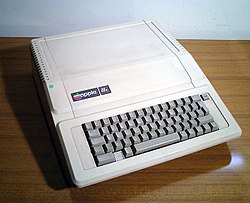 Those were the days...
Those were the days...
A Micron Pentium 90... wow do I feel young I started in Paradox and moved to Delphi, Python, C/C++, Haskell, etc
Apple ][+. Had to buy a chip to be able to display lower case on the green-screen monitor. But it had a TV out and could do some games in 16 colors, quite a big deal at the time (1981). Then bought an Apple ][c and after that a Commodore Amiga 1000 (1985). The Amiga was quite a computer for the time as well.
Commodore 64C with external floppy drive followed by a Compaq Presario 486. First ISP was phone modem through AOL and then a 10Mbit dorm room connection at Cornell. Talk about a jump in connection speed.
 - Such a sweet machine - I remember saving programs to tape, and then high-speed dubbing to another tape for backup purposes - though I had exposure at school to early Apple computers, which I think might have been before we got a PC. I didn't get serious about programming until we got a 286 16mhz AT PC with GW-BASIC though, I think because I was always kicked off the Vic-20 if people wanted to watch TV.
- Such a sweet machine - I remember saving programs to tape, and then high-speed dubbing to another tape for backup purposes - though I had exposure at school to early Apple computers, which I think might have been before we got a PC. I didn't get serious about programming until we got a 286 16mhz AT PC with GW-BASIC though, I think because I was always kicked off the Vic-20 if people wanted to watch TV.
Anyone remember this Advert? [1]
[1] http://www.google.co.nz/url?sa=t&source=web&ct=res&cd=6&url=http%3A%2F%2Fwww.youtube.com%2Fwatch%3Fv%3DPUEI7mm8M7Q&ei=4AjWSKPcD4KUsQPT2rDmDA&usg=AFQjCNE6cUIipUTwkv9tysjMhLavWDDaGQ&sig2=CzByNNF0Ps_Lw3N3msym8gCompac Deskpro - PII 350 mHZ, 128 RAM, 6 GB HDD, 4 MB graphic card.
I bought this computer in 2005, for programming in C++ ;)]
http://i38.tinypic.com/nef5up.jpg
Acorn Electron. After developing a nasty obsession with taking electronic things apart and trying to "build" computers out of wire and cardboard boxes, my parents finally took the hint one Christmas back in 1986 or so.
I had quite a lot of fun just messing about on it, and then one day I discovered BASIC.
Acorn Electron with tape drive. Programming BASIC and playing Repton.
Cybermax AMD-133 (overclocked from 90 [I think]) with 16MB RAM, 56k modem, 20GB HD, 4MB video card, and 17in CRT. My wife was generous enough to let me get it with her 401K check after she quit teaching.
Not to brag, but the next Christmas I got another 8MB RAM from CompUSA with my $50 gift certificate. True story.
Sorry, no pic. Cybermax went bankrupt in 2006 and I can't find any images.
Self-built 386DX with 170 MB HDD. I don't remember how much RAM it had, but I believe it was 2 MB or something.
It ran MS-DOS 6.22 and Windows 3.1, and I learned MS BASIC and PASCAL on this baby. =)
Commodore VIC-20! 4k of RAM baby!
Elektronika BK-0010-01 (Электроника БК-0010-01) with Vilnius BASIC in ROM.
I had a HC91 - a zx Spectrum 48k copy when I was young (very young - 10 years).
More info here [1].

Apple IIe

Zenith 386 with a 512 MB hard disk

HP-65,
I was like single-digit in age and heard my father and uncle debate whether this was a "universal computing machine" and the answer came down to that little DSZ at the bottom... I had to try it.

Well.... an Apple IIe at school, which prompted me to get a Commodore 64 at home, which was my only computer from 5th grade until sometime in my first year of college (in '90-91). I did BASIC, Assembly, and Pascal on that little beastie.
Incidentally, I had my C64 modded to add a second SID (sound) chip for six-voice stereo music and a 512K memory cartridge (I think... it might have just been 256K) for use with GeOS.
I'd add pictures... but there's already plenty ;)
A 48k Apple ][+ with a composite green screen and a tape drive.

Vic-20 but before that I had been exposed to something similar to the KIM-1. The vic-20 would be considered more of a home computer...
466 mhz celeron, hehe, I started late, voodoo3 was such a beast for halflife1 and counterstrike
I first started with an Oric Atmos ... 48K to do wonders in 6502 Assembly language ...
An old HP pavilion running Win95.
An 8088 IBM-Comaptible XT from just before ATs came out. It had a 16 color VGA screen with a screen saver (in MsDos) that displayed a colorful clown.
It had a menu which was nothing more that a bunch of batch files and a listing of them displayed at the end of Autoexec.bat. I found that out wanting to add a new game to the list. That was all the spark I needed.
Thanks for a good minute of nostalgia.
Asaf.
First 'home computer'? BBC something or other. First one I bought? Mac Classic.
An Acorn Electron, though the most complex program I wrote for it was something like:
10 print "Hello!"
20 goto 10
It was cool at the time..
First one I used properly was a Commodore PET that my dad used to bring home from work to keep me amused in the school holidays. The first one I owned was Sinclair ZX81, and I upgraded the memory myself by relacing the 1k memory chip with a 2k one, and wielding a soldering iron to change a link so it picked up the difference.
From there on to a ZX Spectrum, but also programmed BBC Micros at school, along with a UK101:

At uni I had an Amstrad PCW8256, using the cracking CP/M O/S, and Turbo Pascal (I think) for proper programming.

I'll start singing "Memories" next....
Atari 800 XL with 64KB (16KB of them were ROM)
TRS-80 - you know it!

Commodore 64. I want to emulate it in Silverlight!
Orel BK08 (ZX Spectrum clone produced in USSR back in 1991)
With Basic onboard and using cassette player to load available programs.
Commodore Vic-20 with tape cassette to save data.
Atari 800 - still have it, still works.
Tandy 1000 with an add-on 20 mb hard drive card. Dual 5.25 floppies and we had the RAM upgraded to 640k. That machine rocked on good old GW-BASIC.

Like so many of you guys my first computer was the Commodore 64. It was sold as a multipurpose computer, but I mainly used it for playing games.
Mine came with the classic tape drive as disk drives was really expensive back then.
Favourite titles: International Karate +, Ghostbusters, Commando.. ah brings back.. For all you old C64 fans, check out the C64 tribute band Press Play On Tape [1]. I watched them at the JavaZone'08 conference in Oslo last week, and those guys are really great ;-)
My second computer was a Commodore Amiga 600 (anyone remember those?). I had a ancient 14' Sony color TV (from 1972) in my room that I used as monitor for both the C64 and the Amiga ;-)
[1] http://www.pressplayontape.com/Sinclair ZX Spectrum 48K.
The good: It introduced me to programming.
The bad: It was BASIC.
Also, IMHO, the best keyboard ever.
Oh how I miss my Commodore 64. SID Chips FTW! :)
From about 1984, my parents had an IBM PC 5150, and I was so mad that it had no graphics of any sort. My friends all had Spectrums and Commodore 64s. We had a total of 2 games - Othello and "BUGS!" (a Centipede clone done entirely in ASCII characters which I still can't locate anywhere on the web to my increasing dismay). I broke Othello trying to reprogram it. Doh!
But actually, no graphics turned out to be an amazing thing as I ended up loving text adventures so much that I started writing them and programming very badly in BASIC. One thing led to another and now coding pays for my whole life. I still kind of miss the glowing green text-only interface though... but not the endless floppy disk failures. Ugh.
Oh, and I still hanker after the days I spent on my Amiga 500+ which is now going yellow in my attic. It still works somehow, just with a few more guru meditation errors.
The
Commodore VIC-20
[1].
It had a cassette deck for permanent storage, and plugged into the TV. Had about 3.5 kb of usable RAM, more with an optional memory cartridge.

http://www.xs4all.nl/~tluif/chescom/EngCCmk2.html
Computer name: Chess Champion Mk II
Manufacturer: Novag
Dates from: 1979
Dimensions: 23 x 15 x 6 cm (including display height of 2 cm)
Power supply: adapter from 220 to 9 volt
Rating: beginners / weak occasional players (Elo 1090)
Other details: operated via keys
red LED display
produces tunes
same program also in housing with rounded edges
Commodore 64, but with a tape driver. Writing down and loading a program was taking few minutes. Not saying about head calibration.
My first computer was the Sinclair ZX-80.
I got my first computer late!! when I was in college! With 512MB ram and 40GB HDD... I fell in love with her the very next minute it came home!!!
IBM 386 when I was like six years old, loved playing on that thing
Wang 2200 T [1] plus a whopping 5MB hard disk the size of a dorm fridge.
I wrote a joystick-controlled text editor for it, because it had no mouse.
-Al.
[1] http://www.wang2200.org/images/cpu_2200t.jpgPackard Bell 486 DX2, 4MB RAM, Win3.11. ;)
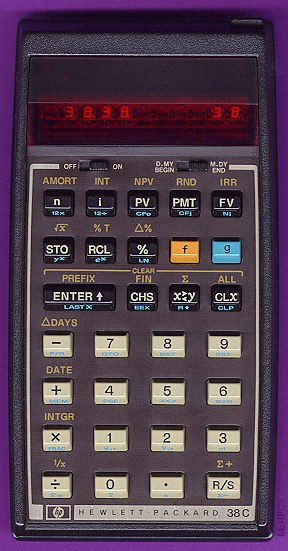
HP 38E programmable financial calculator. They thought I must be doing unbelievably complex calculations at the bank where I was working, but actually I was programming this thing all day long. Still have a little notebook with the handwritten programs, which was needed because there was no way to save them.
My first was an Amstrad 2286. Tere was a game written in QBasic where you were an ape and you had to throw bananas across the screen that I loved playing. That made me want to code something of my own in Basic and so that's how it all started.
Used a TI-99 for years, but in 1990 we made a leap into the future when we got our 12mhz 1MB of RAM 286 from DAK [1].
[1] http://en.wikipedia.org/wiki/DAK_IndustriesOooh ... Old days :) AX170 - SAKHR ... contains only Basic and painter !!
http://www.s77.com/up/up9/df70f8504d.jpg
http://www.elektronik.zolls-im-netz.de/c-one/zx81/zx81.gif" alt="alt text" />A faboulous ZX81 with a massive 1k of memory!
My first PC was HC 85 :)
As with a lot of others, Commodore 64.
Hyundai 286 that my parents bought me from a PC Warehouse in NJ. Yes a Hyundai like the car.
Commodore 64! That was approximately 20 years ago...
A Color Genie!
I still have it in my office (as a show piece though!) :)
A pentium 200 with mmx Using Visual Studio 6 we had that thing pumping out Open GL 3D images from C++! USING 128 mb OF ram and a 4GB harddrive.
The Tandy Sensation (486, 4mb ram, 1x cdrom, windows 3.1)

The Apple ][+ at school in 3rd grade. The countless hours spent after school writing GOTO statements were sheer joy--except perhaps when you had to shift all of the line numbers because you didn't leave large enough gaps!
Vector Graphic with David Ahl's BASIC Computer Games:
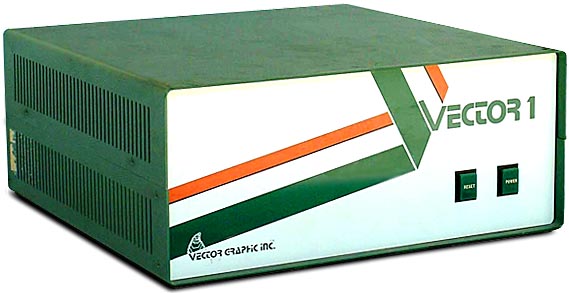
A custom built PC from a local shop, which I got in 2000.
AMD K6-2 450 MHz, 32 MB RAM, 13 GB HDD, 8 MB SiS 6326 AGP, ISA Sound Card, 14" CRT
Commodore 64! I learnt basic and assembly on that wee beasty :)
I had a TI-99 in college, but I never did anything useful with it. My first home computer I had for real was a HP 150 in approximately 1984. I was one of the very few people to have a computer in college. It had a touchscreen monitor!! My mother worked for HP as a programmer, so she got a discount on it - it was only about $5K. I used it all through college and for at least four years afterwards.
But what made me fall in love with programming was taking a programming class in high school in about 1980.
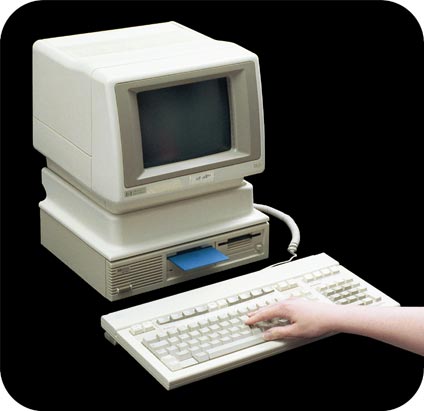
My first computer was a Hewlett Packard with 128MB RAM, a 20GB hard drive, and a Pentium III at 533Mhz. The price was about $1300 at Best Buy.

We had a Laser 128 [1] (Apple IIc clone) that we got in about 1989 when I was in 8th grade or so. I did some sweet Basic on that baby...
[1] http://apple2history.org/museum/computers_clones/laser128.htmlMine was an Oric Atmos. ¿Does anybody remember it?
Ohio scientific superboard II -- 8k RAM, MS BASIC, an old B&W TV, and a cassette tape recorder
Apple IIe compatible
I'm another early sinclair lewis 1000 user (before the Timex version) around 79 /80 I guess - it was the one with 1K ROM 1 (it could have been 4)K RAM.
K
I had an atari 400 with 16k of memory. And yes I did write code in BASIC on the thing. I later upgraded it to 64k and a replacement keyboard to overcome the membrane keyboard that was rather cruel to code with. Ah, the life of an 9 year old.
For me, it's a toss-up between the graphing calculator (TI-85) that I programmed in high school and the original IBM PC, where I first learned programming in BASICA
TI Professional
Atari STm, connected to a monochrome TV, with an external floppy and GFA Basic!
I also started with the Vic 20. Still have the books somewhere. The computer died spectaculair because i tried to do other things with the casette port ;-).
Lots of sweet memories (or should i say mid life crisis).
TRS-80 as well. Had a couple of 'game' coding books, one with superheroes on the cover, and I forget the other one. Although the one I had wasn't the model pictured, and we just used a TV as a monitor.
Tandy 1000 SX ... I made that thing do quite a bit.
An IBM Thinkpad 300c

At school we had TRS-80 Model 1s with the mini-tape drives, later the school got the TRS model IIIs. The first one I had at home was the TI-99 4/A, with the Peripheral Expansion Box which made it look a lot more impressive.
I don't actually know what it was, but the Internet tells me that it looked like a Compaq Portable III. Amber monochromatic screen, keyboard that attached to it, BASIC and WordPerfect.
My experience, was on a Apple II, and it was formatting a floppy disk. I thought it was the coolest thing i'd ever seen or done!
Radio Shack TRS-80, not sure of the model number. I actually discovered my parents setting it up at 11pm on Christmas Eve, so not only did I confirm the non-existance of Santa, but I also got to setup my own present that year.
Apple IIe for meee
ZX81 and after a few years a Atari 800 with an assembler cartridge.
An original Digi-Comp [1] that my father bought for me in 1966.
[1] http://www.mindsontoys.com/kits.htm?dc1_main.htmIBM 486-DX2-66!
Epson Equity II+ 8088 640k addressable RAM 40 MB HD Monochrome Monitor
My first computer was a Timex 2048 (TC2048), a ZX Spectrum-based machine with enhancements, namely a cartridge port to make it compete with videogame consoles.
My first computer was the TI-99/4A with a black-and-white TV for a monitor. But, my first laptop was the Radio Shack TRS-80 model 100. 40 columns by 8 lines. I loved it because I could modem (tip?) into the university VAXen and work from home. It was glorious.
I learned to program in TI-82 BASIC. Programming was so much better than paying attention in class!

The INTERACT.

Mine was a Brazilian Sinclair Clone from Microsiga: The TK-83 [1]

I miss the box of tapes I had :( Mostly 3D Monster Maze [2]
[1] http://www.old-computers.com/museum/computer.asp?st=1&c=1019I started programming in school on a TRS-80 while travelling abroad. But my first home computer was an Apple ][.
Apparently it seems that Thus far, I am one of the very few who had a cursed Apple /// or Apple III or Apple 3, or affectionately a Crapple.
Crashed more that (Windows 95)^2
See Wikipedia: Apple III [1]
[1] http://en.wikipedia.org/wiki/Apple_IIIThe IBM PCjr, with extra RAM and a floppy drive. No hard drive, but we had the Basic ROM cartridge - you plugged it into the front and always had basic on-hand, which was really cool. My dad got me my first Infocom games to play on it.
I had several early computers. One of my favorites was the TRS-80 color computer, known lovingly as the Coco. It was a great little system, with a nice set of games. remember writing my first assembly program on it, by using the poke command :)
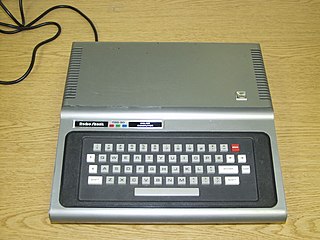
When I was a kid I had a VTech, which is basically a toy. Back then, they actually included BASIC interpreters and that was my first experience with programming. I am very sad not to be able to find such a "toy" these days that is actually programmable.
Sord M5. Played games for a few days, then found the cartridge marked "Basic G".
SordM5 [1]
[1] http://commons.wikimedia.org/wiki/File:SordM5.jpgMy First Home PC was Pentium 1 , 120 Mhz, 1.2GB HDD, 8MB RAM......it ran Windows 95 then...used it for 4-5 years....
Timex Sinclair 1000 that my parents bought for me at a grocery store. Followed four or five years later by a Commodore 64, which I used for about seven years (until college).
I still have both computers...
Sinclair ZX Spectrum 16K, later upgraded to a mammoth 48K! My Dad bought it directly from Sinclair Research Ltd in 1982.
Commodore 64, it's BASIC language and some times later I've get back to this machine and had fun with motorolas assembler.
First computer ever used: one of those Apple II in 6th grade (1989).
First computer at home: My dad bought an IBM PC clone by Hyundai (1890). MS-DOS with GW-BASIC.
I'm another Sinclair boy. Started with a ZX80 (for my 10th birthday (and christmas too, since it was so expensive!)). I was a Sinclair fanboy for years too. I even had one of those awful QL things [1] with the microdrive ...
[1] http://en.wikipedia.org/wiki/Sinclair_QLSinclair ZX Spectrum 48K. After a total of 2 weeks with BASIC managed to find the complete ROM Dissasembly book and learned a LOT on programming and neat techniques. That was when I decided to be a software engineer
Apple IIc. I actually ended up hauling it back and forth to Junior High School for almost a year.
Mine was the Apple ][e ... and learning the 6502.. mind-expanding stuff.
Wow, this is a nostalgia thread. How come plastic these days doesn't have the excitement that it had back then?? I am looking at the great images of machines people have posted above, the machines that I recognise and I can recall the totally awesome power I felt when my hands were on them. Yet I have my hands right now on a quantifiably much much much more powerful laptop... yet it feels lame in comparison.
Bring back POKE!
Mine was the Timex Sinclair 1000, then an Atari 400, 1200xl, (and some other weird models I can't recall), but the computer that really got me all revved up was a C=64... I Read Jim Butterfield's ML book, and never looked back.. :)
Gateway 286 sx 16mhz /w 2MB ram and a 20mb HD
Commodore 64
Like many, the Commodore 64
Commodore +4
I haven't played on it for a year, because I was so impressed by programming in basic and later in assembly.
I still have a working one in my closet, with casette, a catrigde with Commodore Basic from the Commodore 128 series, and the learning kit for assembly.
Sharp MZ-731, with built in printer and cassette drive! :)
Am I the only one?

My first computer was a C64 too - I also made my first programming experiences there. :)
pentium..I was 15 when I got my first computer...that was incredible time...:)
The first machine I used was an AIM-65 [1] clone. I had 1K of RAM. Machine code monitor, Basic and Forth in ROM. It was heaps of fun :) I can still remember programming the thing in Basic.
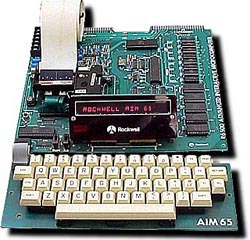
This Windows ME machine. Kinda feel a bit young. I've been collecting old "vintage" machines as a hobby lately. A proud addition that I've come to own is a Commodore 64. I adore my 64.
A Sinclair ZX Spectrum - a UK rubber keyboarded home computer from about 1982
486 Acer which was smoking hot compared to my friend's 386 lol! circa 1989, I think?
I'm pretty sure it cost about $2K and I remember my dad muttering under his breath about how expensive it was, "Could put a down payment on a car for that much grumble...".
IBM PC Convertible Model 5140.
A heavy clunker of a box at 13 pounds. Mine also had the optional printer that attached to the rear and printed on thermal fax paper. What a joy it was to type up your own documents, only to have to go to Staples to make a copy of it on "real" paper :))
I spent lots of hours programming Basic on it, which I learned from a book. I actually wrote a file-based Hangman program that loaded the words from one of the floppies :)
Cant help it ...
Dell Studio !!!!!
Apricot F1e - 128k RAM, single floppy drive, 9in green on black monitor. It was a thing of rare beauty... I used it to write my O Level CS project in GWBasic - it was a little thing that solved quadratics (surprise, surprise..!)
There's a pic of one at http://is.gd/y1Uh
Leading Edge
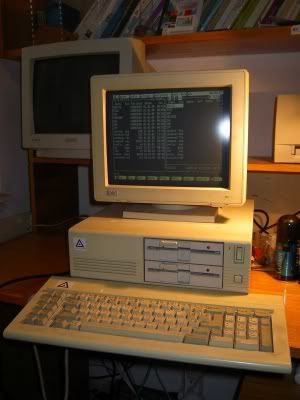
A Heathkit H8 (sorry, no picture)
2MHz 8080 16K of RAM (I splurged!) Audio tape for storage.
Purchased in kit form, everything except the CPU card had to be hand assembled and soldered. The 10 slot backplane took a lot of patience.
I also bought a H19 video terminal, but that was back ordered for a few weeks. So I got to run hand-assembled programs keyed in on the front panel in octal until that arrived and I got to use the assembler.
Six months later I bought a floppy drive and controller and never looked back.
An Atari 130XE. 128kB of RAM, tapedrive and floppydrive (overclocked with a so-called Happy chip).
I programmed an adventure game in Turbo Basic. Later, my mother threw out the machine as junk. She hadn't realized the sentimental value. Sob...
Radio Shack's TRS-80
Tandy 1200
My father had a Zx Spectrum back in 1984. I played some games, but then I was 4 and never learned how to program on it. The "computer" I programmed first was the Casio Fx-4500p calculator
I made games, math programs, and even some funny animations!!
A Nascom 2 in 1980
Hardware : 2/4 MHz Z80, 32 kB RAM + 1k video ram, RS232, RF out, TTY, PIO lines, 300/1200baud casette, single board uncased.
Built in software : 2k monitor (NAS-SYS3) & 8k Microsoft ROM basic.
Heavily modded over the years, ended up as CP/M machine with dual floppies and 256k ram. Still have it in the shed, tried powering it up last year, dead as a dodo (doh).
Acorn Atom [1]

6502@1MHz
12Kb RAM
256*192 black+white graphics
[1] http://en.wikipedia.org/wiki/Acorn%5FAtomSinclair QL [1] God bless those microdrives! I then had an Atari ST, followed by a Compaq PC 386!
[1] http://en.wikipedia.org/wiki/Sinclair%5FQLCelereon 400 Mhz, 32 MB RAM. Internet on dial-up. And I could play the first Half-life game on it.
My first home computer used a TMS9900 chip (which was the first one-chip 16 bit microprocessor). I designed it myself and made the circuit board myself. And built it myself, of course.
I then wrote a monitor, translated it to machine code by hand and entered it using the toggle switches on the CPU board. Once I had that I could use the terminal (which I had designed and built myself) to enter machine code more easily.
The storage was an old cassette player where I had ripped out all the electronics and attached straight the the read/write head with my own electronics. But I rarely turned off the computer and had battery backup for the memory.
The first bigger pieces of software I wrote was an assembler and a text editor so I could code more easily. After that I write an operating system (Unix-like, but without parallel processes) and a C compiler.
After a while I also got 5 1/4" floppy drives (what an improvement over tape) and built a graphics card.
Science Fair Digital Computer Kit!

Mine was an Apple IIc. 128k of RAM and dual floppy drives with a good old dot matrix printer.
Ohio Scientific SuperBoard II
HC 85
It was built inside a box made from a mailbox :)
I miss those times so much. I was 12yrs old, and I remember working for a week to write something that would act like a type-writer :)
(that is not ionut, it's ionut's girlfriend)
The Transam Triton - a self-assembly kit based on the Intel 8080. http://www.humbug.demon.co.uk/dave/misc/triton/triton.html
The first computer I owned was a BBC model B but technically the first computer I programmed was a kitset system based on a RCA1802 (possibly a COSMAC ELF [1]) that belonged to a friend. This machine had a set of toggle switches on the front and a LED hex display.
[1] http://www.sparetimegizmos.com/Hardware/Elf2K.htmA Philips P2000T. My father used to work at Philips Research labs. The first 50 machines were sold at a large discount to people working there with the provision that the source code for programs they wrote in the first year(s) would be made available to all P2000 users.
Wow, 12 pages of answers.
Microtan 65. It was 6502 based, had a hex keypad, 1k of memory (half of which was the screen memory), output to a telly. When I could afford it, I added the ASCII keyboard.
My first was an IBM 1620 at Tri-State College (now Trine University).
http://en.wikipedia.org/wiki/File:IBM_1620_Model_1.jpg
Mine was a Digital Equipment Corp PDT11/130, running RX-11.
http://hampage.hu/pdp-11/kepek/pdt11130.jpg
In 1981, my older brother was a regional manager for Digital, and when I mentioned to him that I was interested in getting a personal computer - maybe the new Apple II-C - he said he had a computer at home in his closet he'd be happy to give to me. Elated, I took him up on it and we proceeded to load it up. We parted with him telling me "not to call him with questions". Little did I know what that was going to mean...
When I got it home, I set it up in my den and tried to figure out how to turn it on. There was no manual for it, and no On/Off switch. There was one marked "0/1", but that meant nothing to me. the only manuals I had were for the O/S, and they massed more than the hardware!
Eventually, I got it up and running and wrote my first Basic program on the box.
I later replaced it with a Digital Rainbow (sweet machine!).
My love for computing and programming began when I installed Visual Basic 6 on a Compaq Presario 5528
I had an Atari 400 loaded with 8k of ram. Never thought I would use it all up. We won it from the Pepsi cap game. Way back when you knew you won without having to login to their web site and plug in a huge code.
The first computer I remember using was a dual-boot Win95/DOS. It spent most of its time in DOS, running Mechwarrior 2.
The first computer I actually owned was a home-built 486 with DOS. I taught myself BASIC in the QBASIC interpreter.
Amiga 1000 w/RAM upgrade. Ahh, what a sweet machine.
Does an IBM 5100 count? I had one of those on loan for a little while. As far as computers I've owned the list seems endless. I've had Ataris (800, 1040ST), the ill-fated Coleco Adam, an Amiga 2000 and then a series of PC-clones including a VAXmate before going to custom-build PC hardware until a few years ago when I ended up buying a total of 3 HP Media Center PCs.
And there still isn't a game out there that can compare to M.U.L.E. on the Atari 800 when it comes to getting 4 people excited and passionate playing against each other in a game of economics...
My first computer was a Mac IIvi [1]. I still have it stashed in the corner of a closet. My next computer was a 486 Windows box running Windows 95 and upgraded to 98. That was succeeded by a newer PC running Windows XP. That one's still chugging away. I plan on getting an Intel Macbook Pro soon. (The plan is to put Windows on it so I can boot into either OS.)
[1] http://en.wikipedia.org/wiki/Macintosh_IIvimy first computer was IBM 5170. Learnt Lotus and Basic on it.
My first computer was a Amstrad PC 1640 [1], which is an extended version of the Amstrad 1512 (more memory and EGA graphics! Yeah !).
Mine had two 5.25" floppy drives, and no hard drive (I had to return my copy of "Sim City" to the store, as it required to be installed on a hard drive!).
It was in 1988...
[1] http://www.old-computers.com/museum/computer.asp?c=19&st=1I'm pretty young, so...
Packard Bell C115
My first computer was an ABC-80 8-bit Z80. It had 16K RAM, a tape drive and a BW 40x25 screen. I think it cost around 6000 Swedish crowns in those days which was a lot.

The Spectravideo SV-328:
 As I recall, it had a pretty decent BASIC built into it, with graphics. I distinctly remember the revelation of using FOR loops to draw many concentric circles, each larger than the one before. :) Me being ... oh, around 7-8 years old, it did its fair share of game-playing too of course.
As I recall, it had a pretty decent BASIC built into it, with graphics. I distinctly remember the revelation of using FOR loops to draw many concentric circles, each larger than the one before. :) Me being ... oh, around 7-8 years old, it did its fair share of game-playing too of course.
intel pentium 100MHz 8Mb Ram and the tremendous amount of 1GB hard-disk-space and an borland turbo c compiler - still love that ide - has all you need - except code completion ;)
The Epson QX-11, known also (at least in Venezuela) as the "Epson Abacus"

Quoting (and slightly editing) parts of my nostalgic ramblings from here [1]:
Epson sold in the '80s a PC called the "QX-11". As far as I know, it was only sold in parts of Latin America and -- at least in Venezuela -- marketed under the name "Abacus" as a bundle with some very impressive (if crash-prone) productivity software with a Spanish UI, apparently custom written in-house.
An 8086-2 8Mhz processor, an impressive high-resolution monochrome display at 640x400 (fully graphic) with text sharp-as-knife; a sound chip with 3-channels (sound tones) + 1 ("noise") with 16 independent volume levels; two Atari-2600 joystick ports, a battery-backed RT clock and DOS 2.11 in ROM (fast, floppy-less boot) as well as support for some custom ROM cartridges (I never saw one, and don't know what they were for). The box was about 3" x 10" x 12". The floppies were 3 1/2", but used a 360KB format.
The Abacus software featured always-active WYSIWYG bold/italics/underline display, drop-down menus and mouse support; there was a bitmap drawing program that could be driven with a mouse or a joystick and a spreadsheet with charting that could save to the same file format as the drawing program. The Word processor had on-the-fly text justification, customizable tab-stops and margins that could change anywhere in the document and embeddable images... all this while my peers were using WordStar.
Ah, yes. It also came with GW-BASIC. I was doomed.
[1] http://blogs.msdn.com/virtual_pc_guy/archive/2007/01/04/floppy-disk-image-formats-supported-by-virtual-pc-and-virtual-server.aspx#1415478I started when my dad sat me down in front of an HP desktop computer - single line of 7-segment leds for text, with a cassette interface and a big platter hard drive. Later I played a little with a Sol-20 as mentioned above. However, a couple of years later, what really caught me was the Epson QX-10 that my mom bought to do contract word-processing work.

It was a beautiful machine witih a Z-80, 265K bytes of bank-switched RAM, bit-mapped graphics, running TP/M, an extended version of CP/M. During the day she used VALDOCS, the highly-integrated WYSIWYG word-processing and business software, an at night I got to peek and poke at it with MS-BASIC and 8080 assembler. Lots of learning that summer...
PDP-1 was the first one I used, but they wouldn't let me take it home. The first home computer was a VIC20. I eventually added a 8K RAM expansion for a total of 11.5K and a single side floppy disk drive.
Now that think about it, by very first computer was a slide rule. It was analog instead of digial, but it was still a computer!
I had a Pineapple;
Shortly followed by an Apple ][+ for years, and then a //gs, then a 386 with no math co-processor, and a 486 DX after that... then a Macintosh Quadra 950. It could run Photoshop 2 and had a programmer's button. My PowerMac 8500/120 actually has a kind of forth built in to the OpenFirmware.
Tandy 1000 SL running deskmate [1] followed closely by tons of apple mackintoshes at school.
Glorious Machine.
[1] http://toastytech.com/guis/deskmate.htmlMy first was the IBM Aptiva M Series. The first Aptiva to come pre-loaded with Windows '95. The best part of it was the software bundle which came with out, including the "Hyperman" and "Cyberia" games.
While searching for the brand of Aptiva I owned, I came across this article [1] which announces the new, state of the art system. It was a good read for a trip down memory lane.
[1] http://findarticles.com/p/articles/mi_m0EIN/is_1995_Sept_11/ai_17385153My first was home computer was a Tatung Einstein, but I programmed on a Commodore 64 (my cousins) and a BBC Micro (at school) prior to that.

AST 100 Mhz P1 but didn't found a photo
Tandy 1000EX
Still have my first computer, an Apple ][ plus.
An IBM PC jr. Given to me by my boss at Amdek. I managed to score a Parallel adapter so I could print to a Ricoh daisywheel printer. Found an article on how to modify the floppy controller to add another disk drive (hacked it up and added two more). DOS 2.1 running a modified Vdisk.sys for a ram drive. DOS was in A:, Applications in B: and Data in C:. A few bytes to change the equipment status byte and I was flyin'. Whoo Hoo!
My first computer was a 50 Mhz Windows 3.1 machine that ran everything in DOS.
Science of Cambridge Mk 14
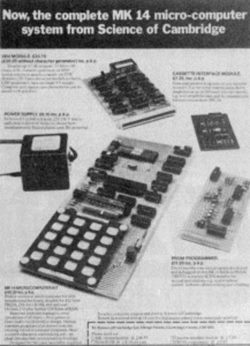
An Oric Atmos
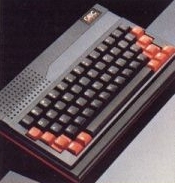
Sorry, couldn't find a better image
Oh ... does a Commodore PR100 count?
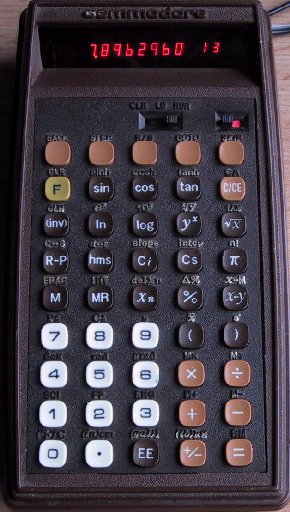
Also a TRS-80 Model I. We had the AT case sized floppy and PPT adapter that sat under the monitor for it, and the floppy disk drive that sounded like a garbage disposal unit to sit next to it.
Amiga 64.
64 kbytes of RAM. External Tape reader/recorder. Just BASIC!!!
Gateway home personal PC
A MSX Sony HB-501P in 1986, and I have still got it and runs ok :)
This is : http://www.homecomputer.de/pages/f_info.html?Sony_HB-501P.html
My first programmable machine :) I develop an Super Mario Version for TI-83 in Basic, very cool :) My first real pc was an Pentium 133 Mhz with 8mb of Memory and 2 gb DISK. Good Times.

Amstrad CPC 464 with green monitor!!!! then i changed it for a commodore Amiga 500 with 1 MB o RAM The i became sentimental and bought one Commodore 64 and a Spectrum zx 64kb After these computers i got an apple Centirs 610 and then my first PC with an VGA card (i do not remember its specifications).
After that PC i got another one just to play flight simulator at Full speed!!!! And after that computer two laptops one Dell and one macbook pro ...rom now on probably only macs...I never learned to program.
Spectrum 128K load "" LOL
Amstrad PCW 8256
Toshiba T3100/20
http://www.technology-props.co.uk/frames/images/toshiba_3100e.jpg
When I was 9, I was offered my first computer for Christmas, a 7Kg laptop by Toshiba. I was happy playing with GW/Q-Basic, Lemmings for Dos, typing some funny texts or filling spreadsheets using Works, stuff like that. Since it had no battery, everytime I was visiting family I actually had to transport the thing itself and to bring the power cord along (which was exactly the same as the ones for workstations).
Here are the original specs: "Model from Toshiba with orange 640*400 plasma screen. CPU: 80286-8 (8/4.77MHz). 640 Kb RAM, 20 M hard drive and 720 K floppy. Operating system: Toshiba MS-DOS 2.11 shipped with earlier models, MS-DOS 3.2 shipped later. Weight 6.6 kilo, size 308x80x360 mm."
Since it wasn't even sporting a 386-type CPU, I could not install Windows 3.1 on it. It was high time I moved to a "multimedia" 486DX/66 PC (but that's another story...)
Yo estube algo más evolucionado... spectrum 128 Kb
Todo un lujo !!!
xDD
Ssasi
Spectravideo SVI 728
Mine was Phillips MSX-2 and it was pretty awesome, yuk, yuk
MSX_Philips_VG8020 link text [1]
[1] http://upload.wikimedia.org/wikipedia/commons/3/31/MSX%5FPhilips%5FVG8020.jpgMSX Sony HB-201P
My best computer ever!!! I still got it.
I'm a newbie in computer world. Before my first computer I played with logo, wordperfect, DOS, Word 95 and mspaint (he he).
My first computer, from 1998, was:
PI processor, 64MB of RAM, 2GB Hard Disk, Win98, 15" monitor, AT power source.
Current PC: from 2005, not much better: Celeron 2.3GHz, 512 RAM, 80 GB hard disk, 15" monitor, ATX power source.
Amstrad PC 1512
TI-99 4a. Dude, that thing rocked.
http://www.heimcomputer.de/pics/cf2700_1.jpg
Panasonic CF2700. My parents got one when I was 10 or so. I consider it my first home-computer, as I hogged it most of the time :D
Hmm, I kind of miss those days of tinkering with MSX-Basic and wondering why people used "subs" instead of goto....... Ofcourse, back then there was no internet on which people could yell at me to not use goto ;)
Xitan Z-80 (alpha 1) from Technical Design Labs.
I had a TI-99/4A. Loved it. Next was a TRS80 Model 100 portable. Both good machines - never crashed. Not once.
My first foray into programming was on a TI 59 calculator. It was so versatile that I took it to work to help reduce my workload, and it got the attention of my supervisor.
My first homecomputer was the famous c-64 , where i have started to create crazy games with basic :-)
After this time, i have bought an 8086 from IBM, with this nice "green" Screen.. what a time..

first was a 386.. Then i upgraded it to 486.. so on =)
Sharp PC-1500 Pocket Computer with 8K of RAM, a cool printer/cassette interface that could print/plot in 4 colors and turn a cassette player (or an external relay) on/off programatically (making for a great little alarm clock that could turn lights on or sound an external bell).
Mine was an Epson HX-20 [1]. Black. I learned programming on it, by editing values from the manual's examples.
Fun fact: I could barely read back then, I was that young.
[1] http://en.wikipedia.org/wiki/Epson_HX-20Commodore 64. It had the tape deck too -- and I LOVED it.
http://www.compuclasico.com/argentinos.php?model=cz.php
Czerweny CZ 2000, argentinian sinclair clon.
Burroughs B22, with a tower, 8 inch floppy
My first was a 386 with DOS and Windows 3.1 that my mom bought from an infomercial on TV. The computer came with a CD of "Where in the World is Carmen San Diego?". The first thing I did was try to insert the CD into the 5.25 floppy drive. I succeeded, but luckily I didn't break anything.
HP-2116. In the minicomputer days, I defined "personal computer" to be "anything you could reboot without anyone caring", meaning a single-user machine. This particular machine was stuck into the lab for experimentation after they upgraded the time sharing system with something newer.
Kaypro with 10MB Hard Disk, Z80 processor running CP/M
how old are you guys?
anyway, i used a pentium III at about 5-6 years ago. i am going to give it away.
Like a few folks here, the C64 was my first. At the time I didn't' think of getting into a career of programming (hell the area that I was from, they still don't' have reliable high speed internet), but had some programming books for the machine, and even made some programs in BASIC (remember GOTO loops? Good times.).
Also found that my one of my uncles was studying up FORTRAN and COBOL back when they were brand new, and used to read (well try too anyways) the manuals from his schooling days. Should have read a bit more, I'd be making more money if I knew that stuff.

Tandy 2000
Commodore 64 with a tape drive.
My First Computer (IBM PC AT). Get myself introduced with Binary world. It was fun writing basic programs and playing dos games like Dig-dug, Paratrooper, Frog, Prince of Persia, F1GP

My first machine was an Olivetti computer with a 486sx 25Mhz cpu, 4Mb of RAM and a 256 Mb HDD. Ah, those were the days. It ran DOOM alright, and that was enough in those days.
Later got upgraded with another 4Mb RAM and changed the cpu to a 66Mhz 486dx.
The box is still around, but not in a working condition unfortunately. I think the motherboard bought it...
ABC 80 [1] Swedish computer based on the Z80 processor and a build in BASIC interpretor.
It was where I got my first taste of programming. At first me and my friend wrote programs that displayed the text from hit songs on the screen.
Later I found that the track for the car-game was described through byte values. If I changed all the values to 0 the game became much easier. (But not as fun.)

Although the Apple IIe was my first computer, the first computer I used and fell in love with programming (10 CLS; 20 PRINT 'HELLO'; 30 GOTO 10) was the Brazilian version of the Japanese MSX, the "Gradiente Expert XP-800", around 1985.
If you look close, it does look like modern PC
The MSX was based on the good old 8-bit Z-80A, with 3.58 Mhz clock and 64KB or RAM.

It was the Intel 8008 [1], in the 70s. I made a little board with wire-wrap sockets containing the CPU chip, a PROM chip, an 8-bit parallel I/O chip, and a timer chip for the memory. Then I made a power supply out of a transformer, diodes, some voltage regulators, and a couple big capacitors, all kind of poured into an aluminum box. I programmed the PROM to play a little duet on a couple of speakers clipped to two I/O lines.
There was a small disk capacitor soldered on one end that, if you tucked it under another wire, would cause the timer chip to slow down by a factor of 1000. That caused the duet to play r-e-a-l-l-y slow, so you could hear the speakers just clicking.
Then when I was a professor teaching intro C.S. I would bring the whole thing to class in a paper bag, and use it to demonstrate how no matter how fast a computer seems, it is still basically doing one thing at a time.
[1] http://en.wikipedia.org/wiki/Intel_8008wang 386 with maths coprocessor!
ZX Spectrum, with its basic was one of the best in the eighties :)
Simply Computers, 100Mhz Pentium, 16MB Ram, 1GB Harddrive, Hawkeye Video Card 1MB video memory, 14" Screen. - Cost at the time (around 1996) £1500!!
"What was your first home computer? The one that made you "fall in love" with programming."
Coincidentally just before reading this question I read a few questions about security. You know, the biggest security problem is unwarranted assumptions. Now even though this question isn't a security issue, it demonstrates the exact same problem: unwarranted assumptions.
My first home computer was not the one that made me "fall in love" with programming. My first home computer was made by and lent by the employer that I was working for at the time, around 15 years after I "fell in love" with programming.
My first home computer had no compiler on it, for any language. If I hadn't already been in love with programming I surely wouldn't have done so from this one.
Sirius Systems and I don't remember the model number.
Russian analogue of ZX Spec, called "Byte"

My first home computer is not that interesting but I would have loved to write my first program on this
Its an ancient mechanical computer designed to calculate astronomical positions
The CPU of my first computer was 586.
it was 100mhz but it was not equal to Pentium100.
people who have P100 could play Fifa97 but i could not.
 The SEGA SC3000. I had the 'H' version (pictured).
The SEGA SC3000. I had the 'H' version (pictured).
started on a samsung samtron monitor with a cpu of CYrix processor


![alt text][2]
Commodore 64 with a Tape drive only. I wrote so much code the cursor would pause for a few seconds after hitting enter...
Later I got a 1541 Floppy drive, from there I was Amiga fan...
Sinclair ZX81, upgraded to 16K with expansion pack. (Originally 1K of RAM.) Did a lot of BASIC programming on it and even dabbled in Z80 assembly.
I still have it, sitting in a box somewhere.
Amstrad CPC 664
This model sat between the 464 (but had a disk drive instead of a tape drive), and the CPC 6128 but had 64K of RAM instead of 128K.
Is still own it!
Mine was a Sinclair Z81.
Amstrad CPC 464 - took so long waiting for the damn tapes to load that I just started writing stuff myself :p

Atari ST 1024, with the mono monitor. Terribly neat machine - sort of a Mac Lite.
At the same time I was coding on an IBM 3090 mainframes at work using Cobol/CICS. C on the Atari was way more interesting.
People, please try to find pictures of your computers to include with your posts. I find them... adorable.
Sinclair ZX Spectrum 48k with a 3rd party keyboard upgrade
Sinclair Spectrum 48K [1] - Real programmers use rubber keys!
[1] http://upload.wikimedia.org/wikipedia/commons/3/33/ZXSpectrum48k.jpgCommodore Vic-20 Boot to a basic interpreter. Had an audio tape drive too. Monitor was a TV. Got it at K-Mart!
ZX 81
getting sentimental
Vic-20, then an Atari 400, then an Apple II
Commodore 64!!